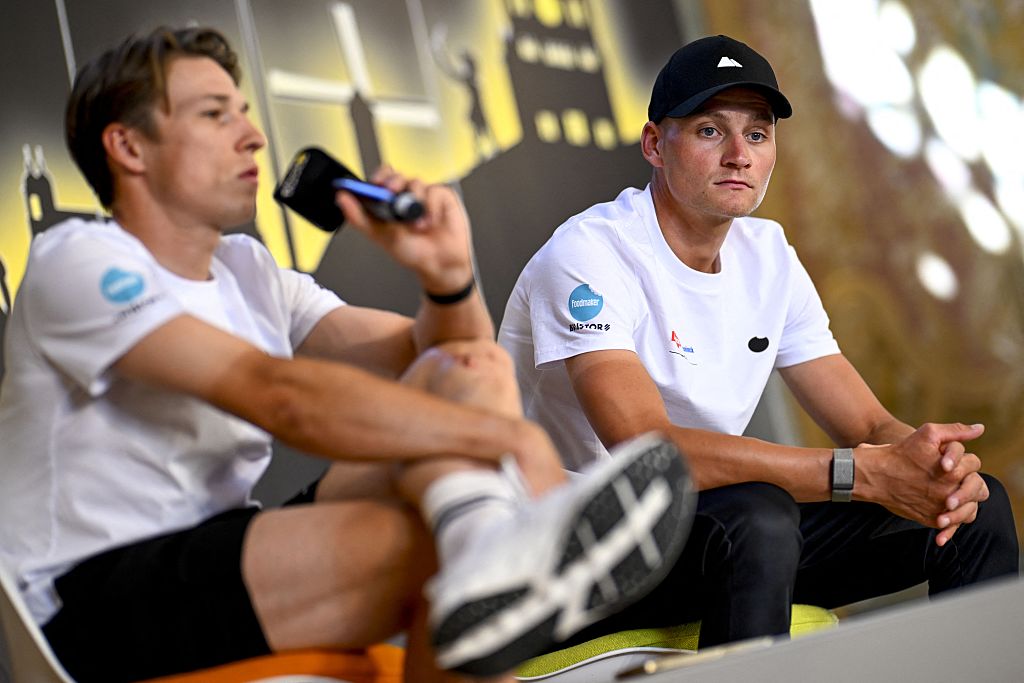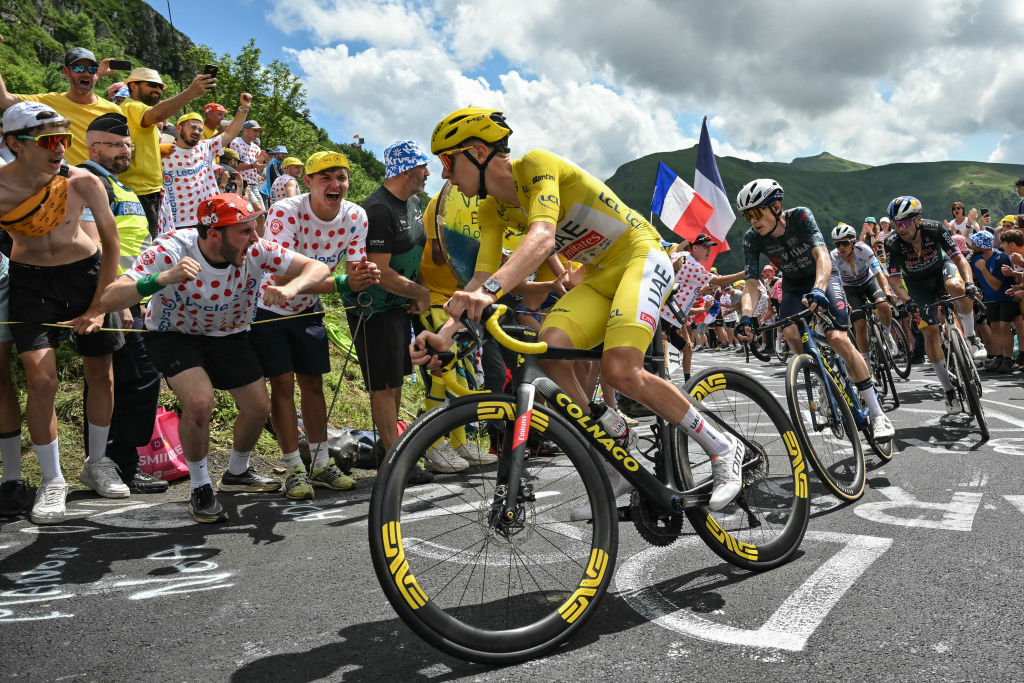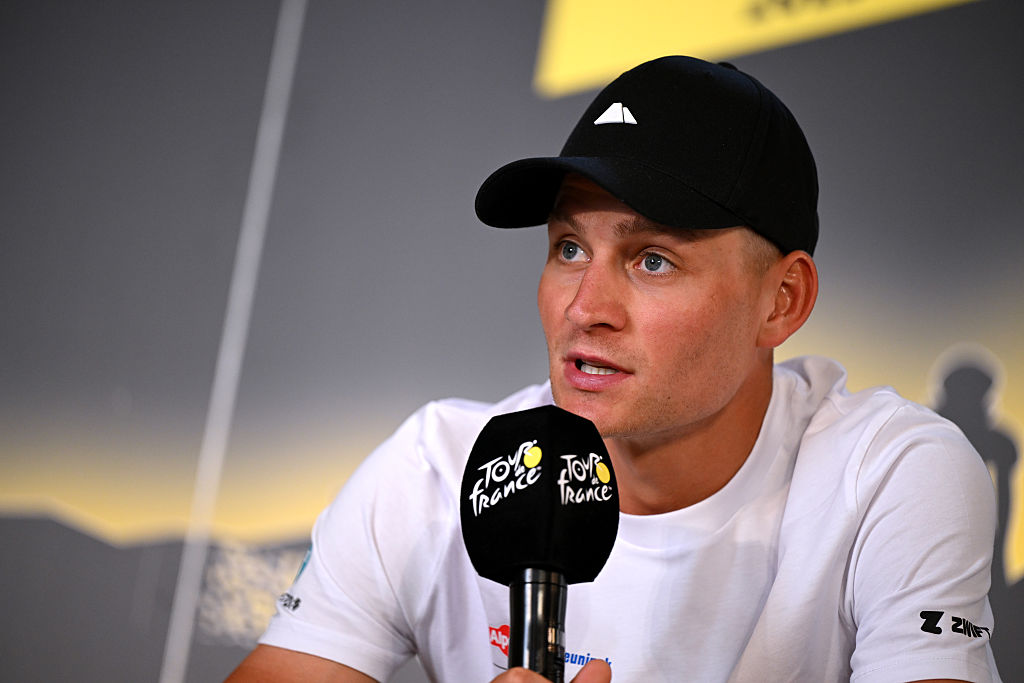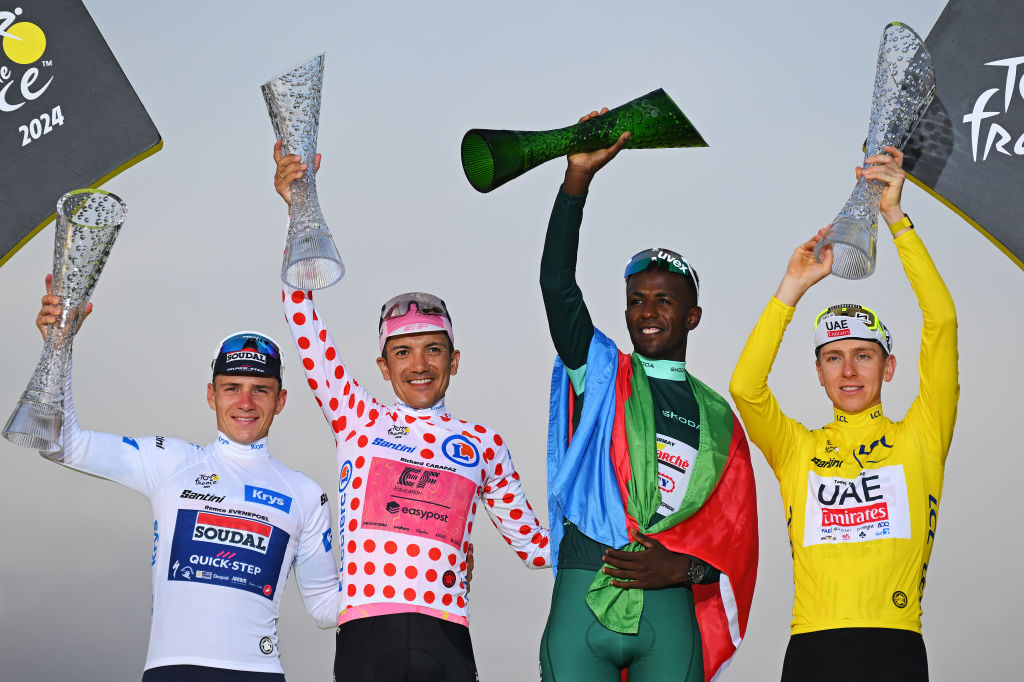Great Britain, Germany earn gold in team sprint events
Great Britain sets world record in men's team pursuit qualifying
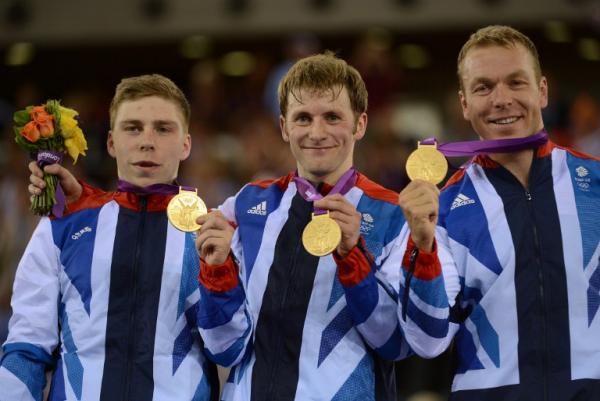
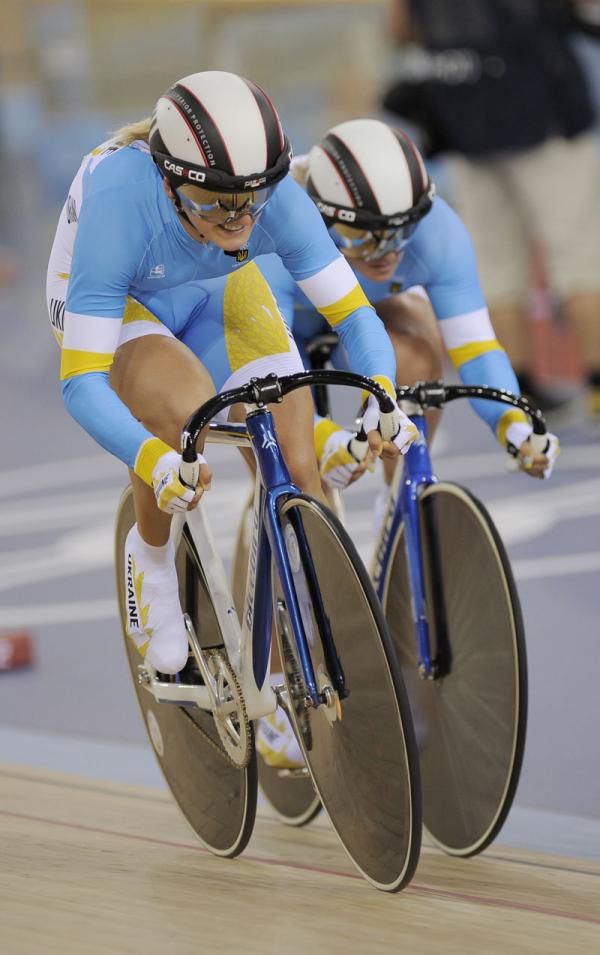
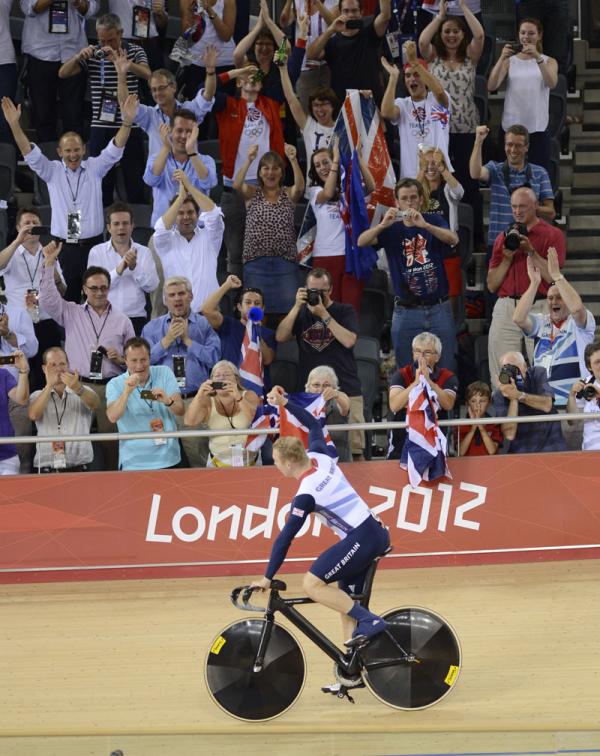
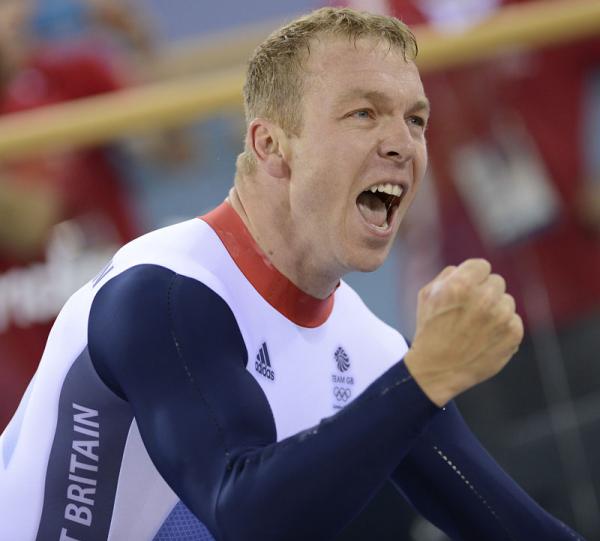
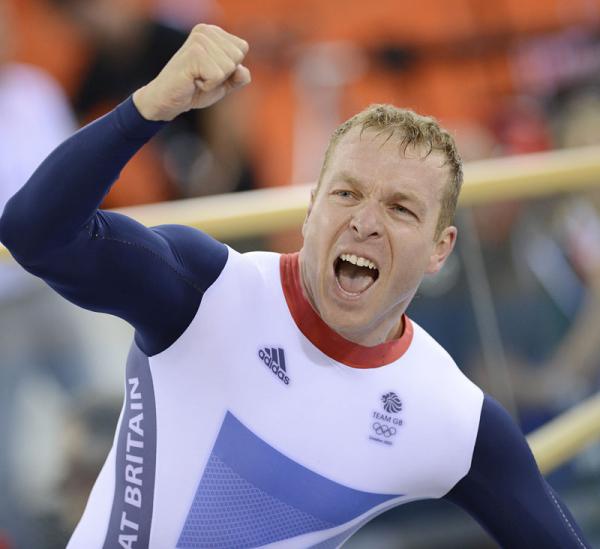
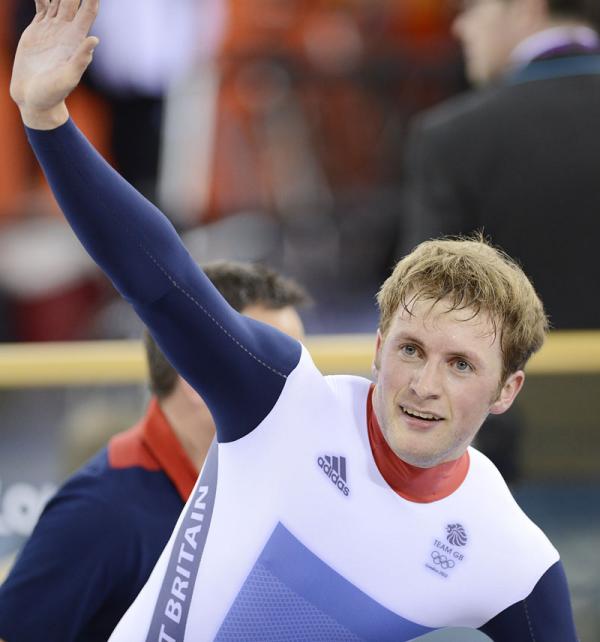
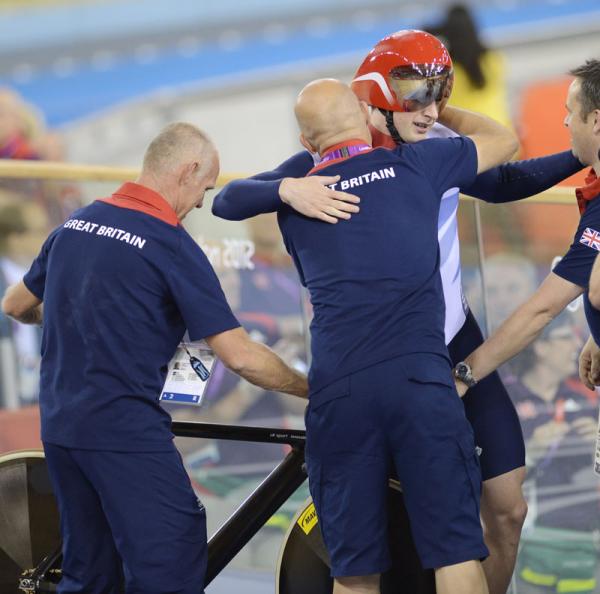
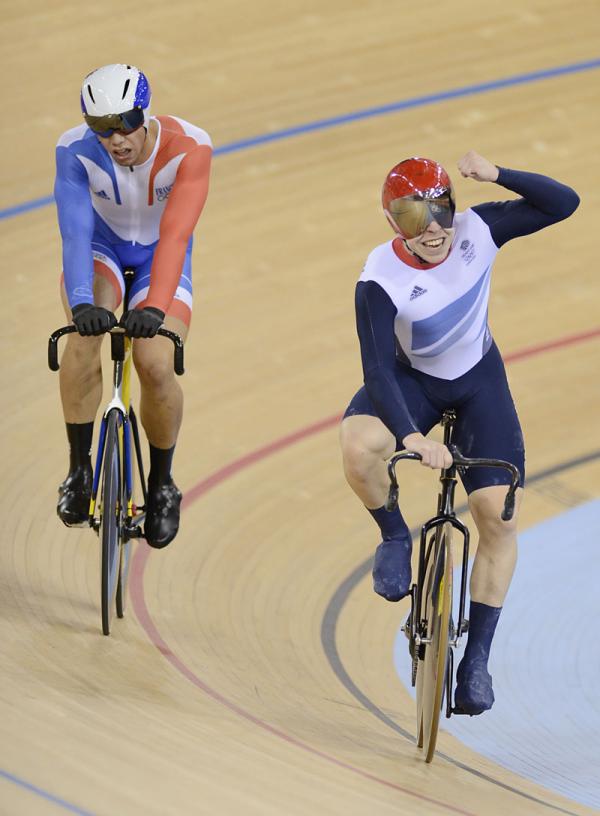
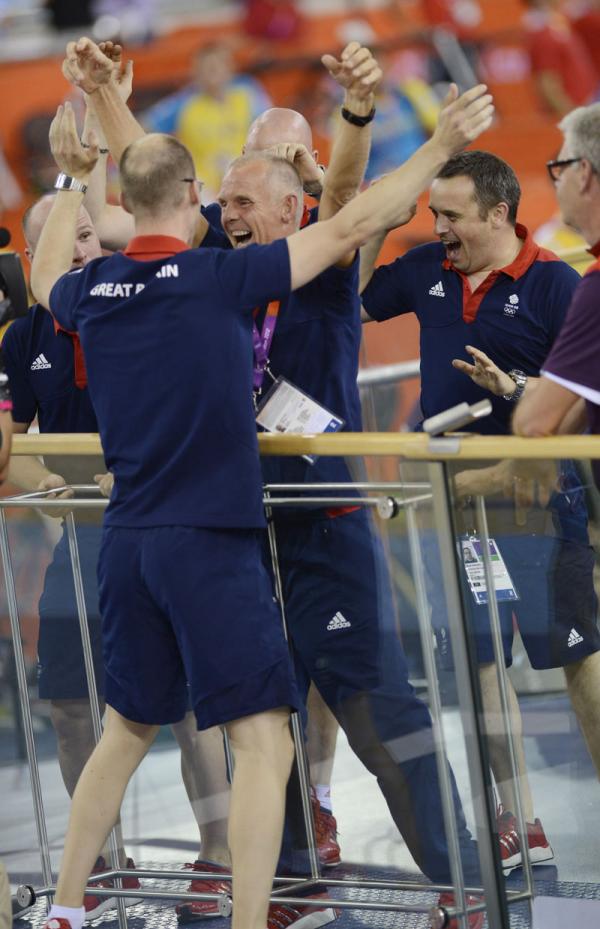
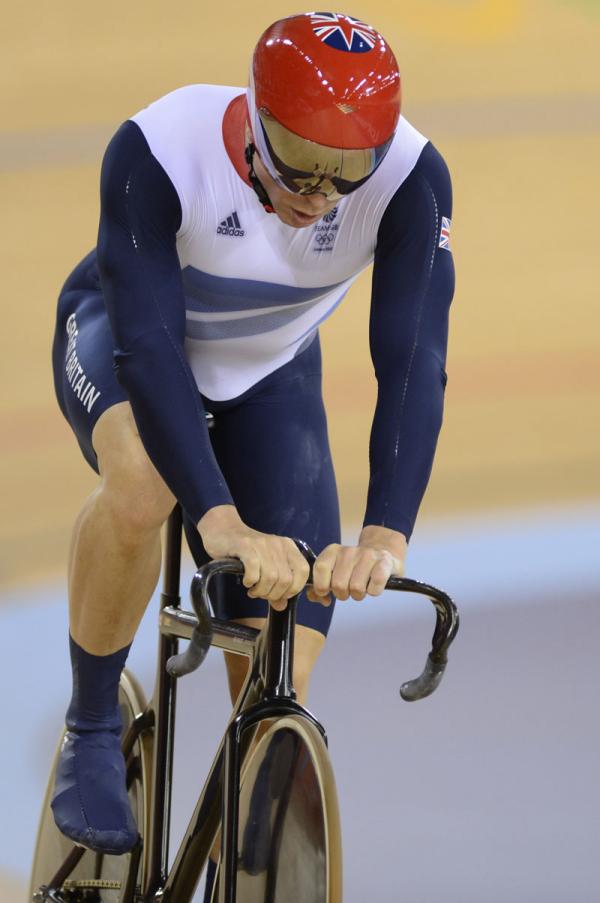
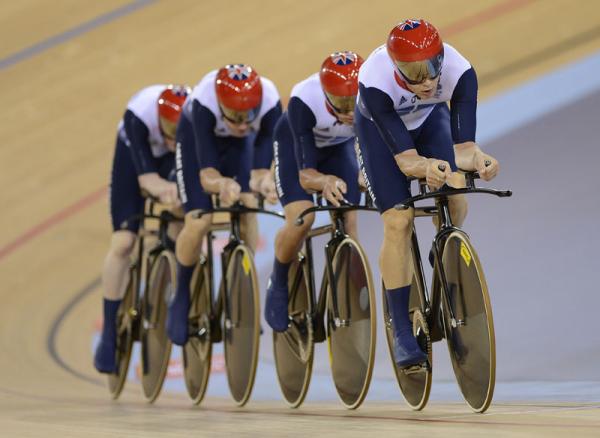
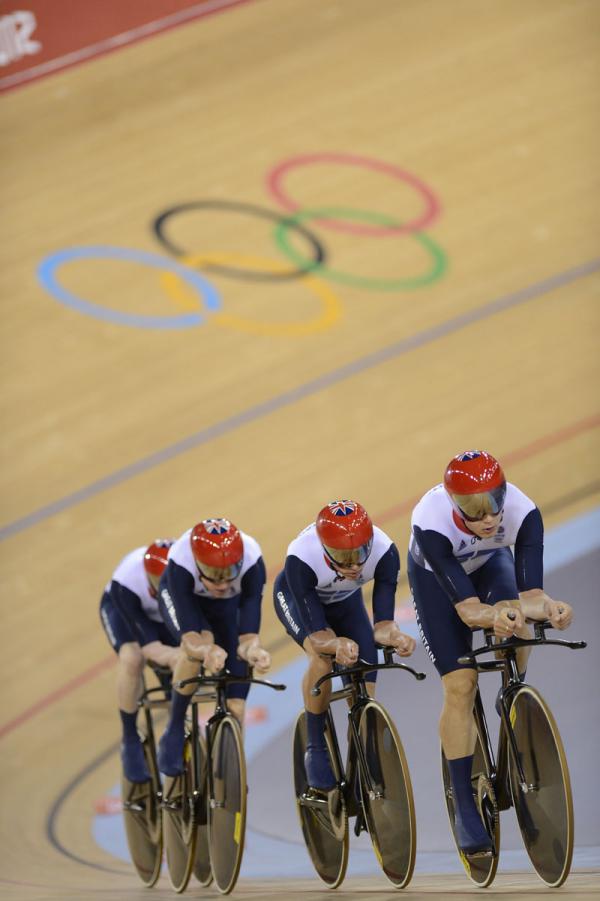
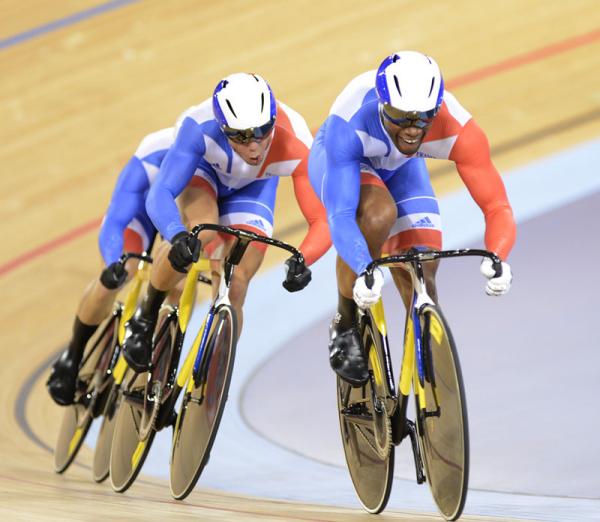
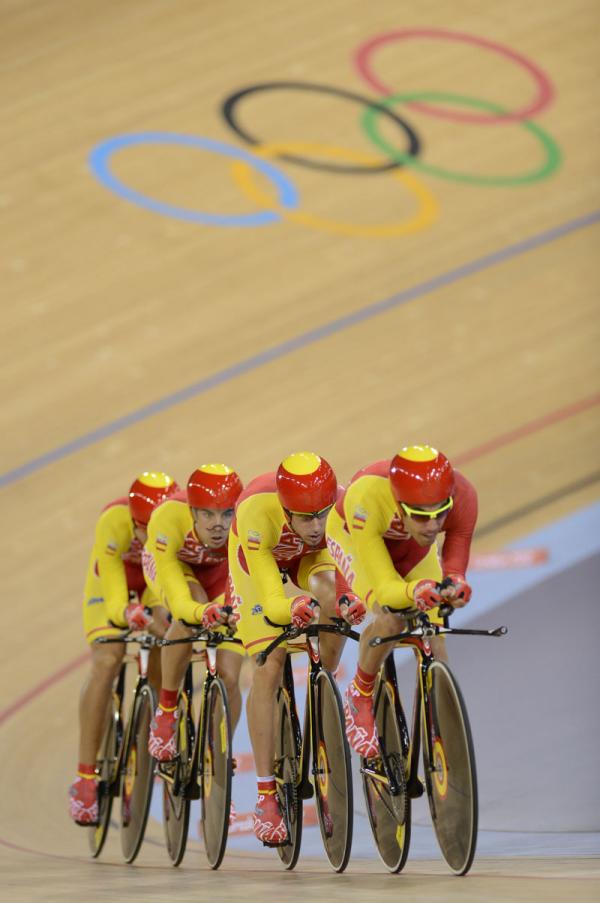
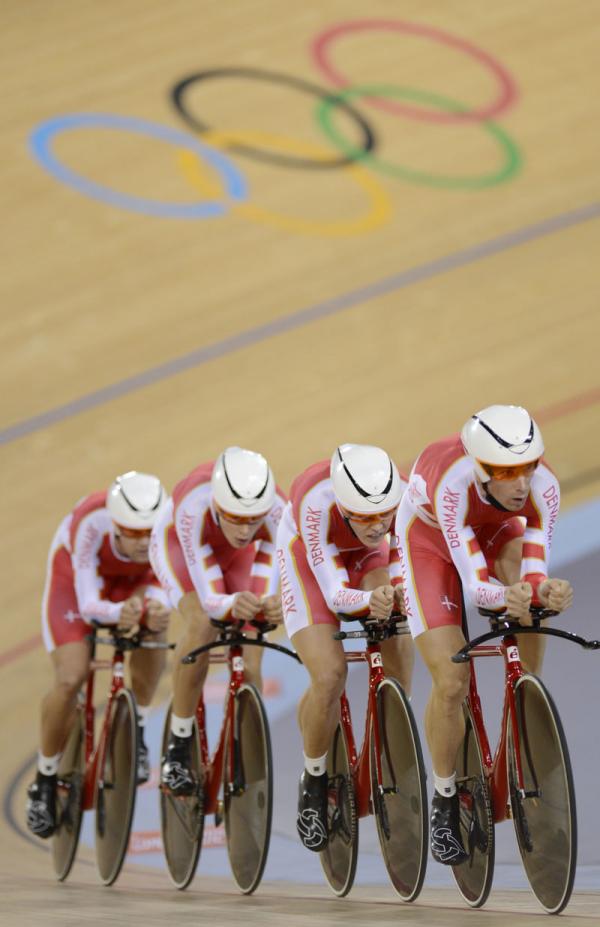
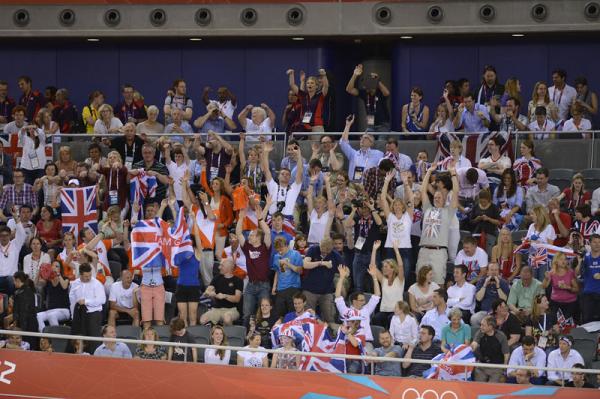
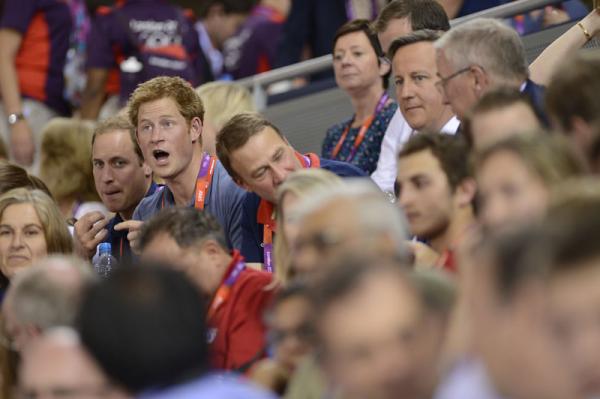
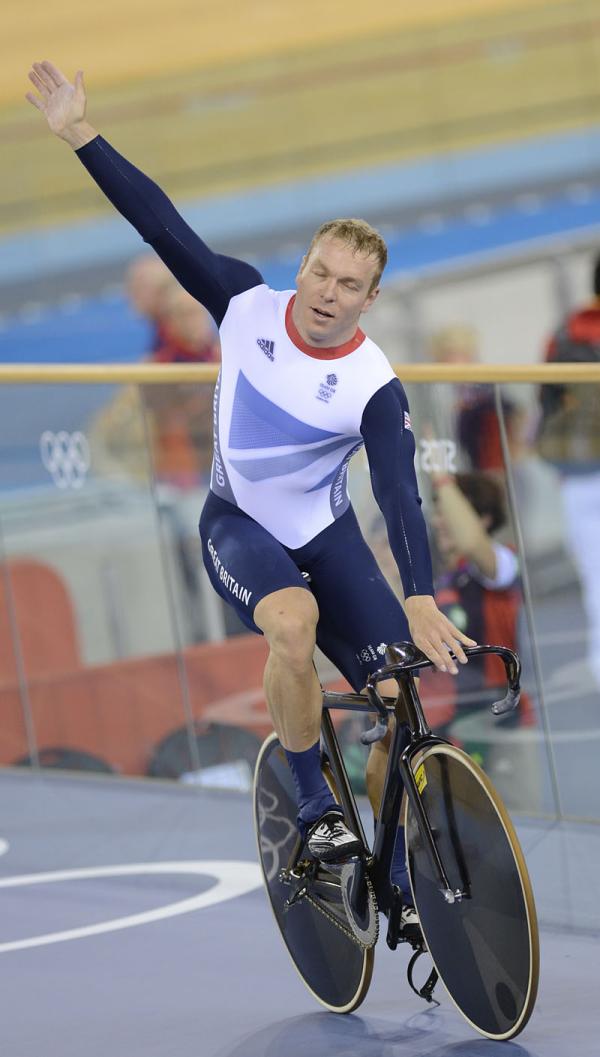
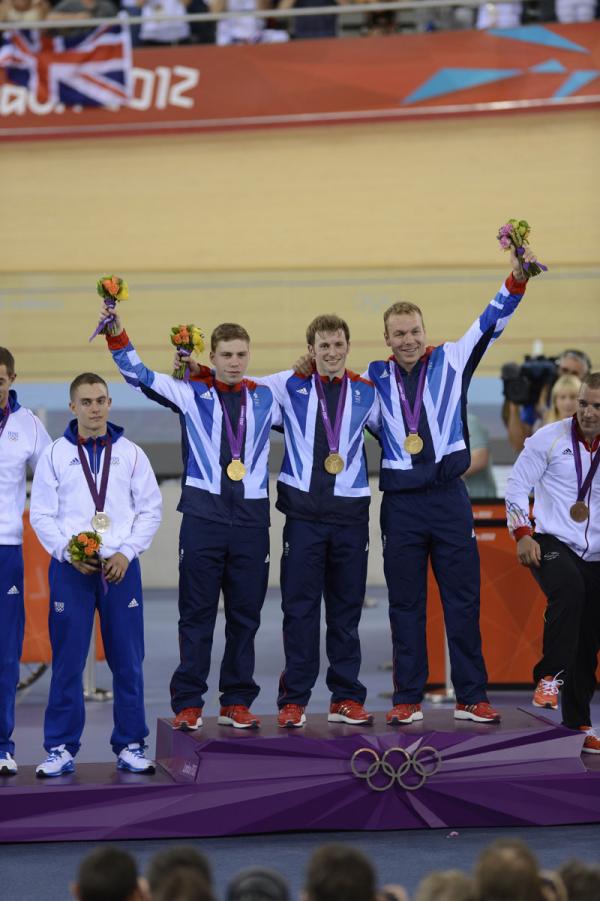
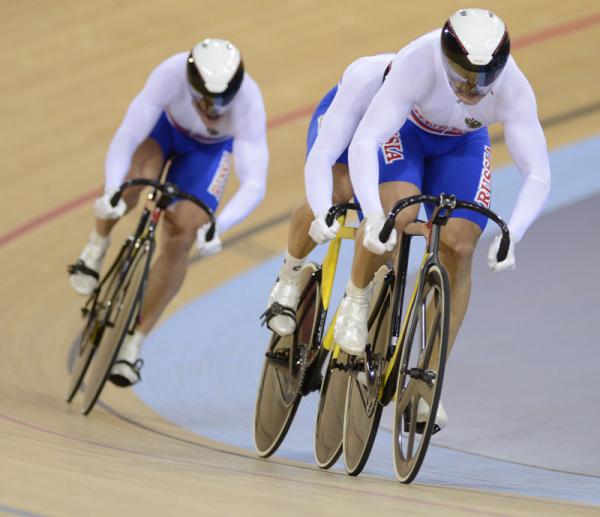
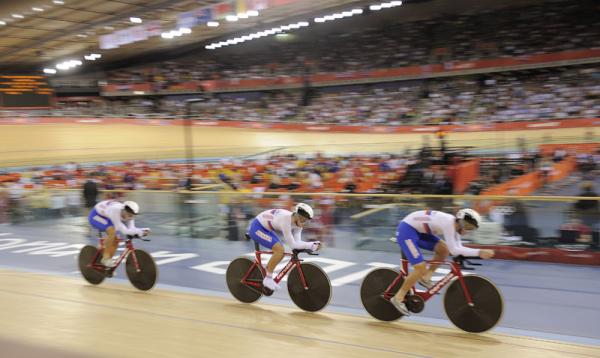
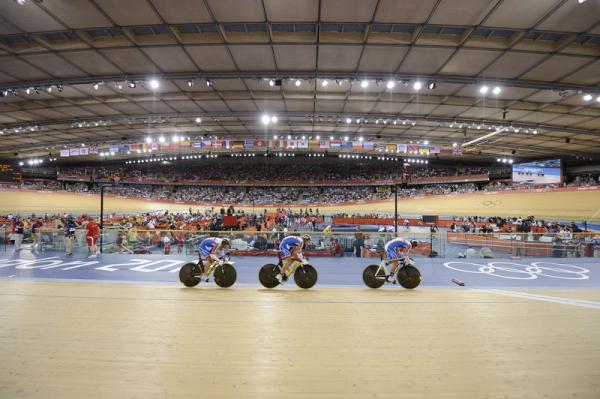
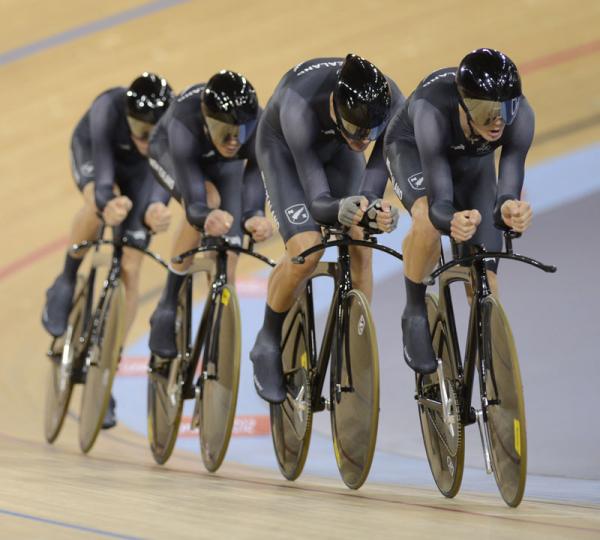
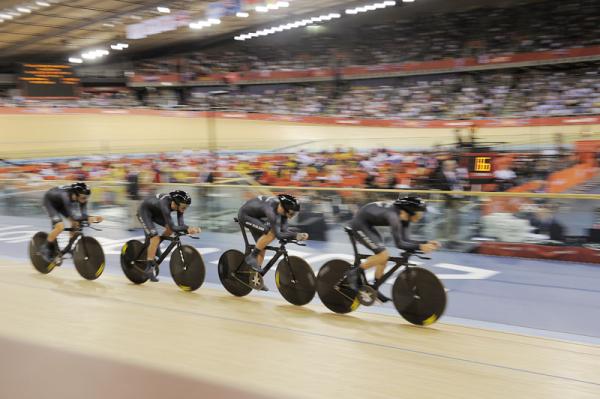
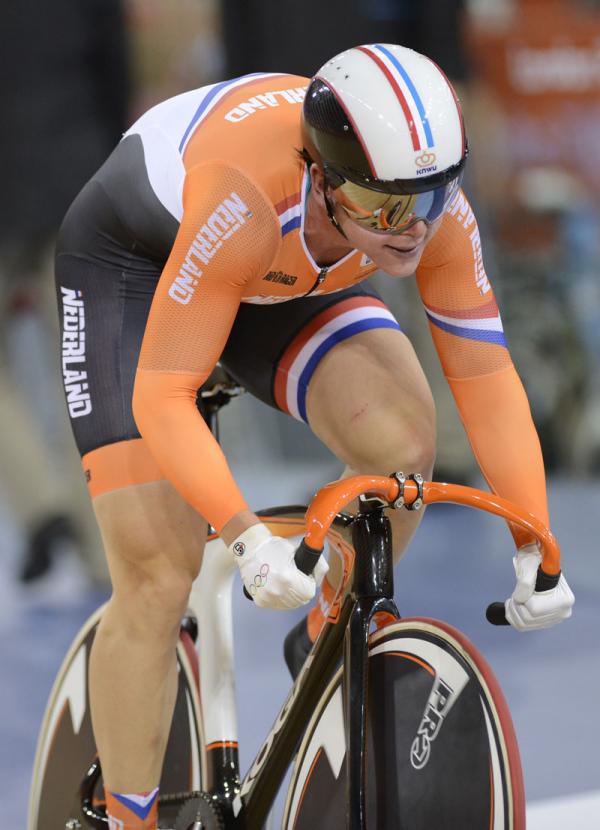
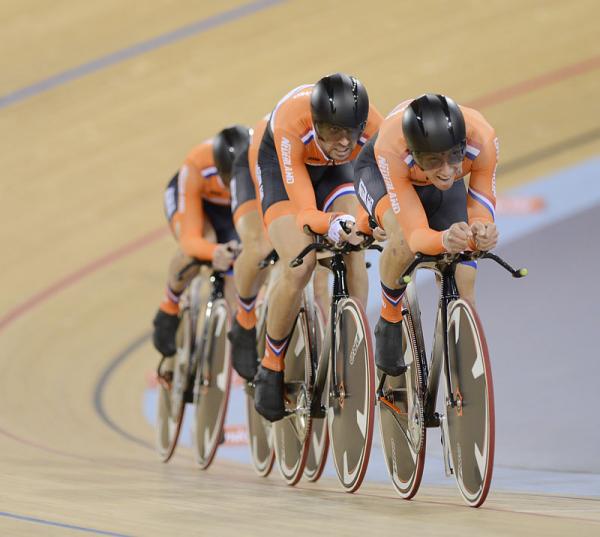
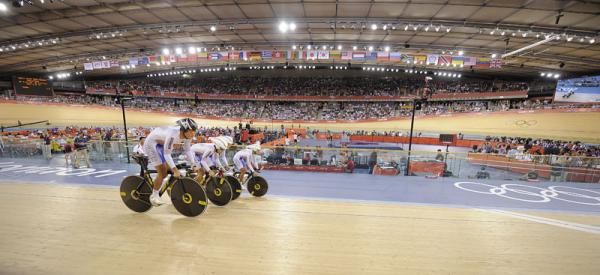
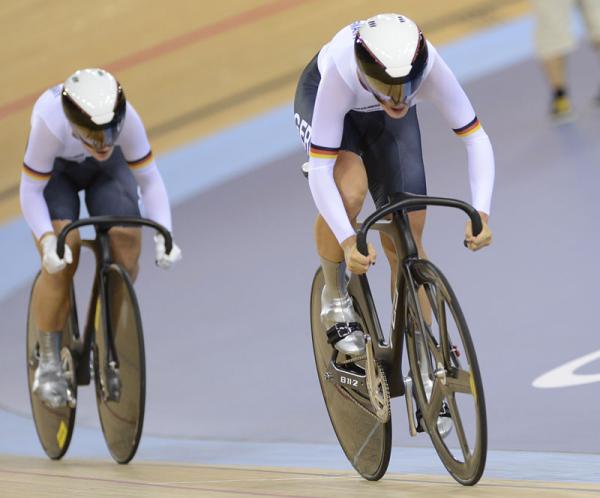
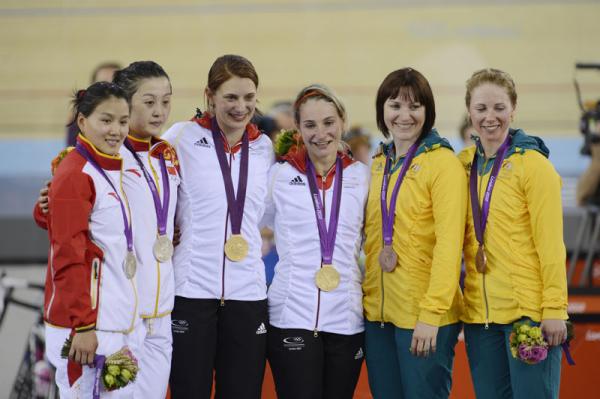
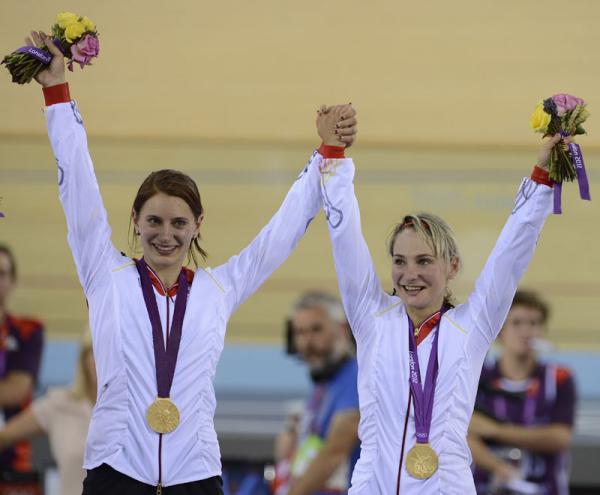
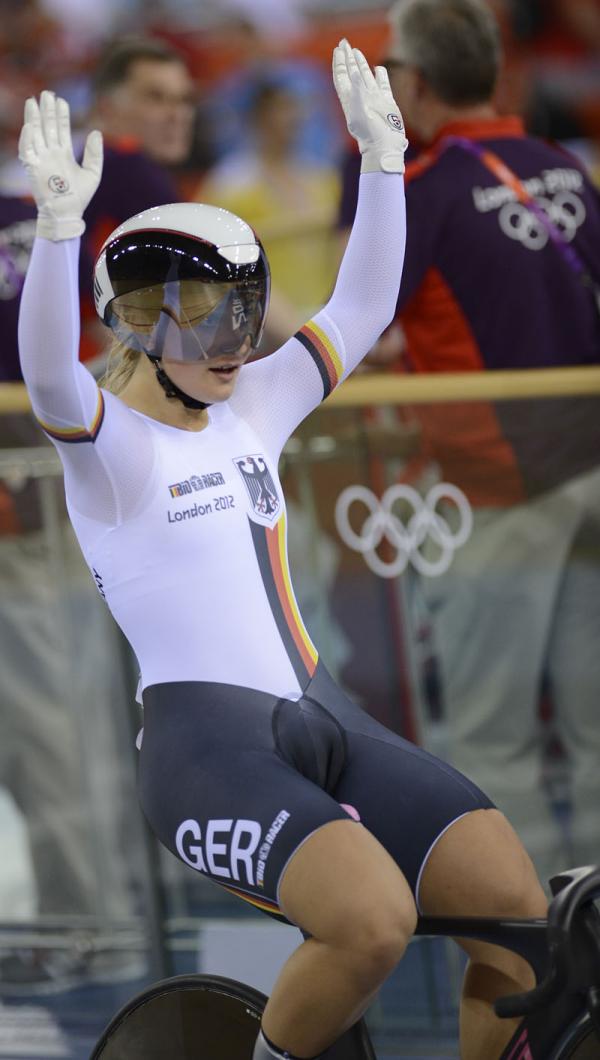
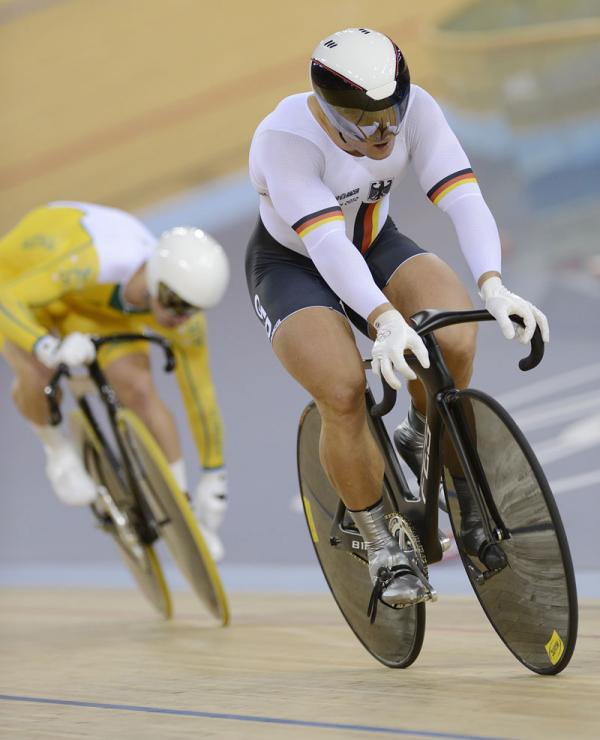
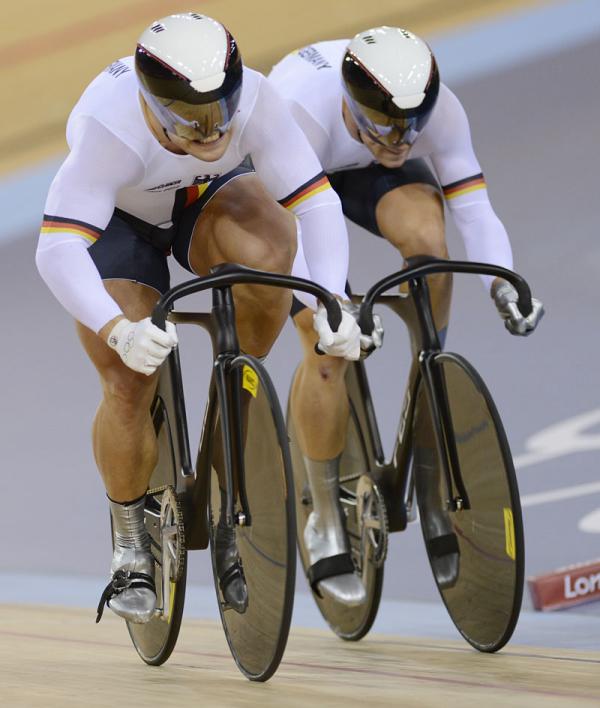
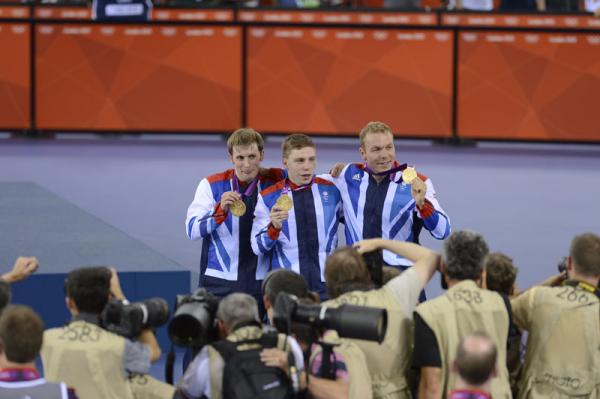
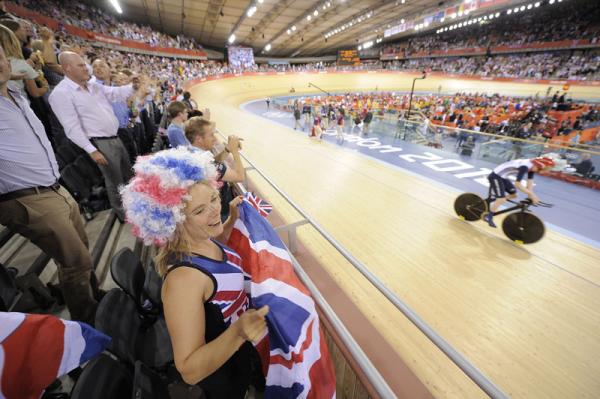
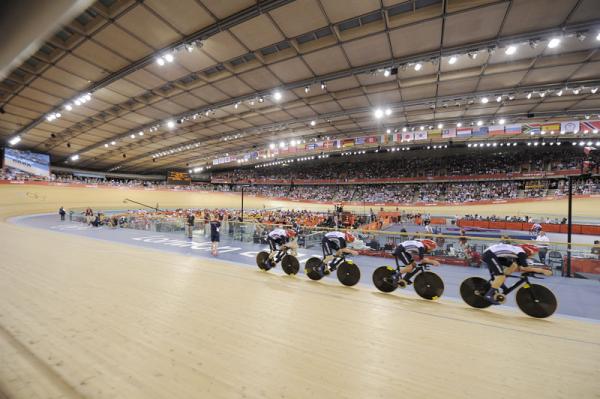
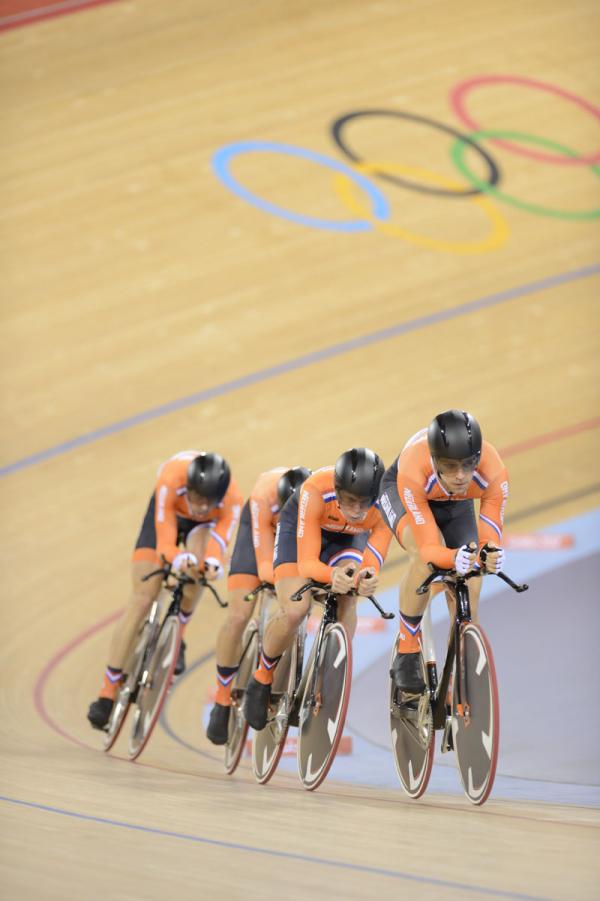
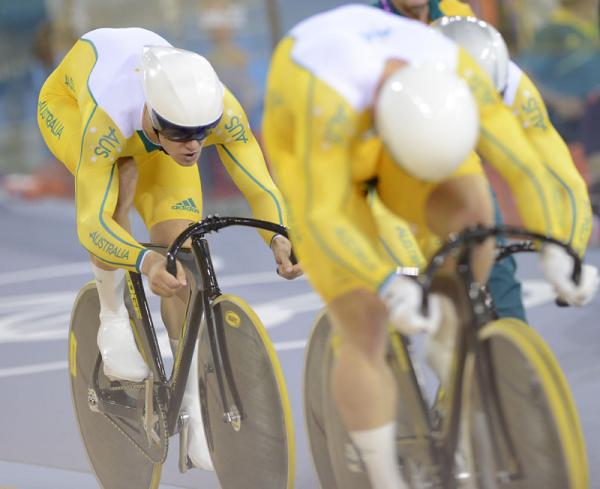
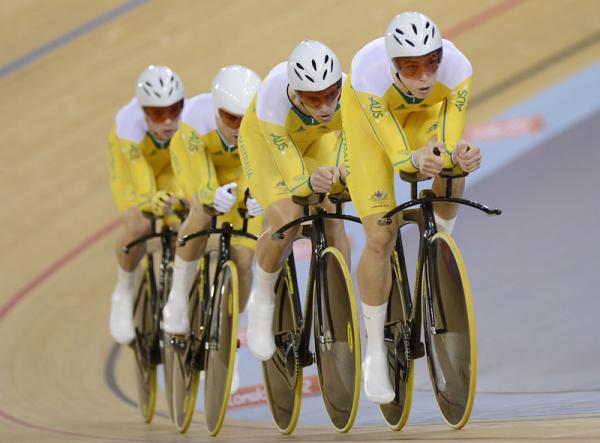
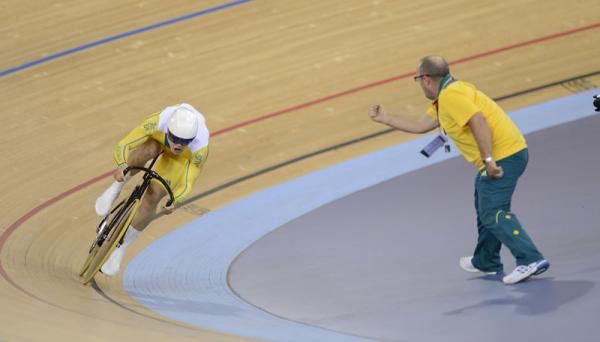
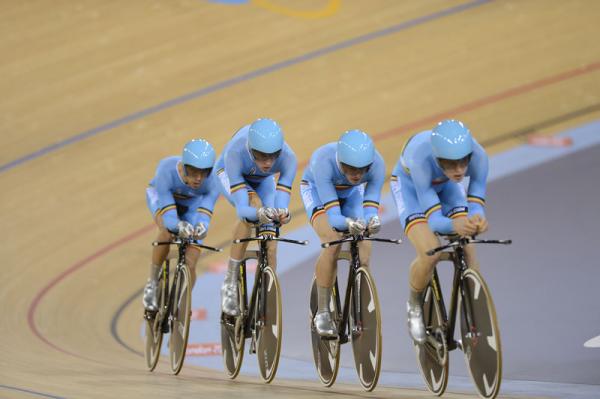
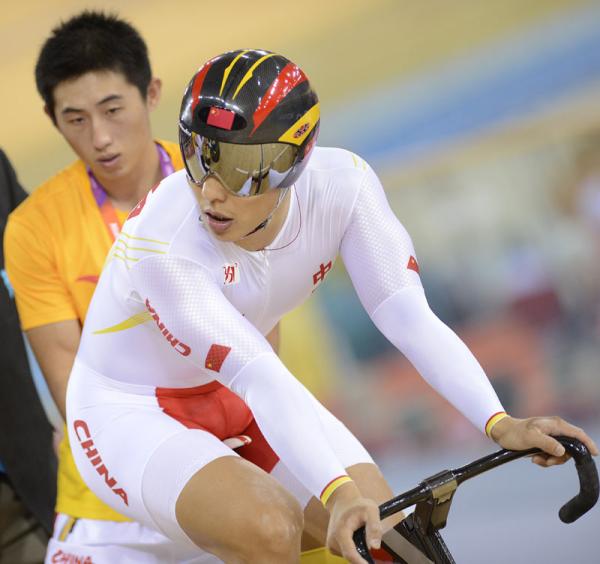
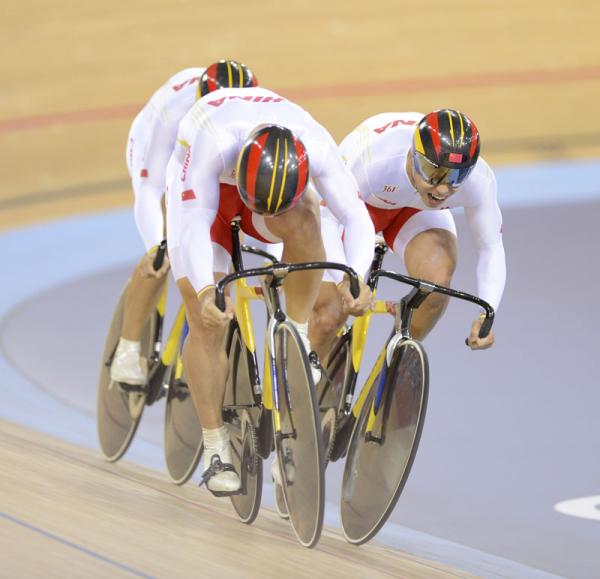
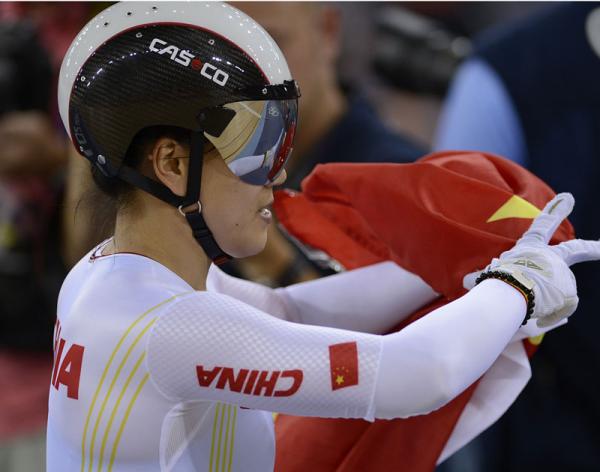
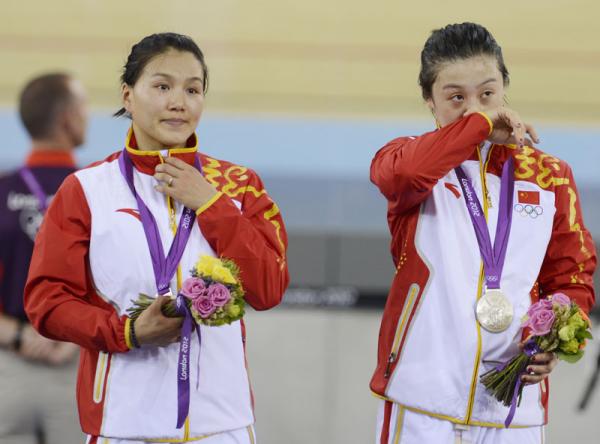
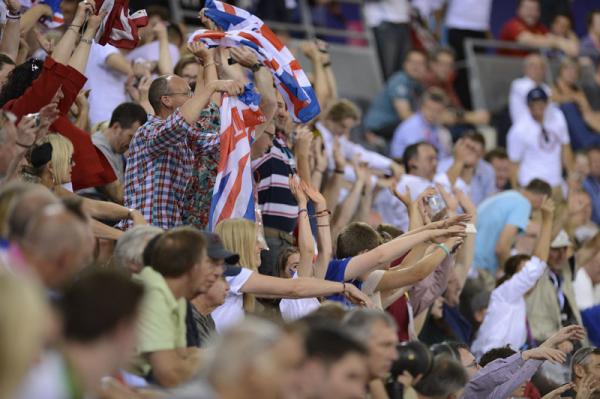
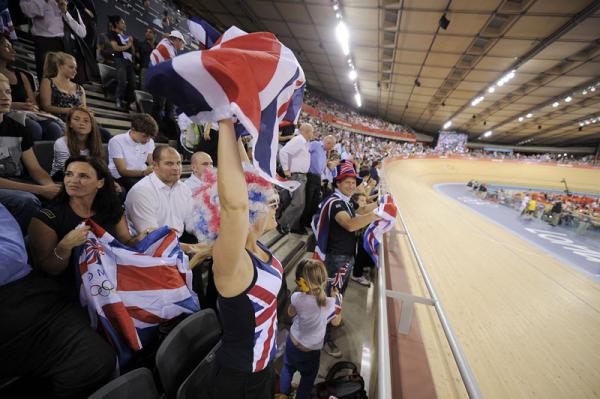
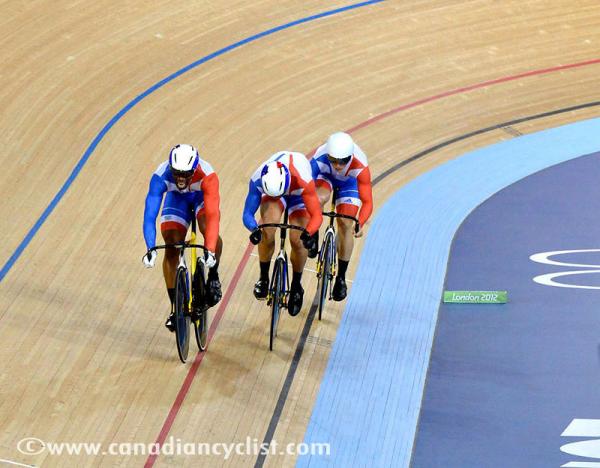
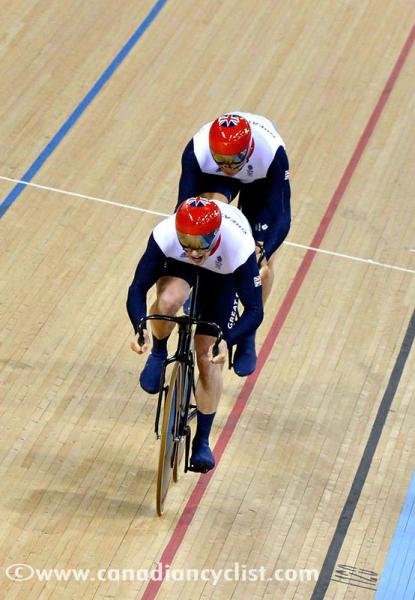
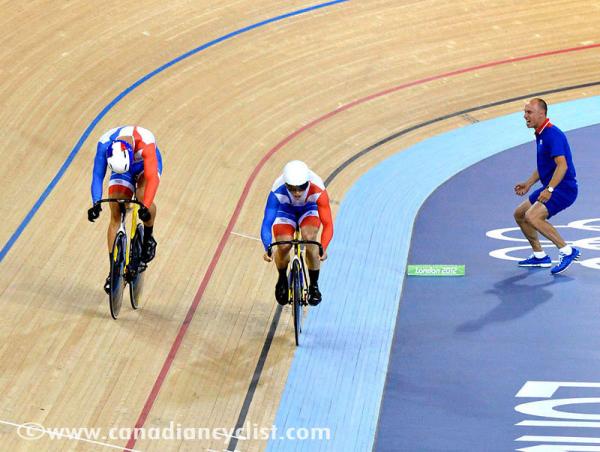
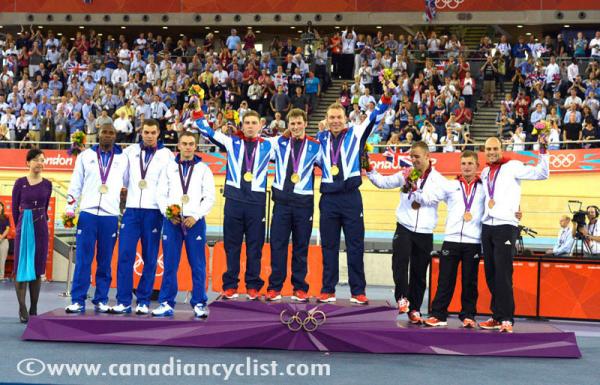
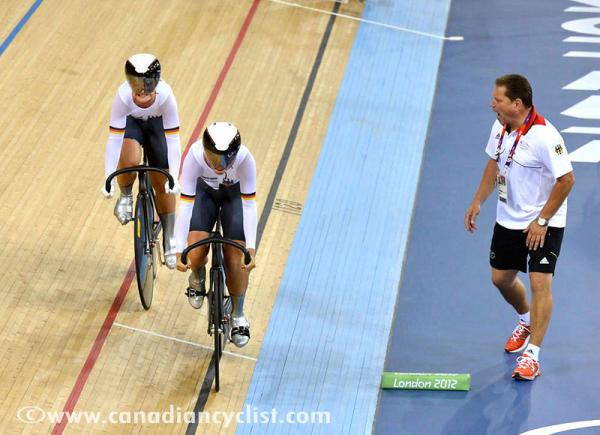
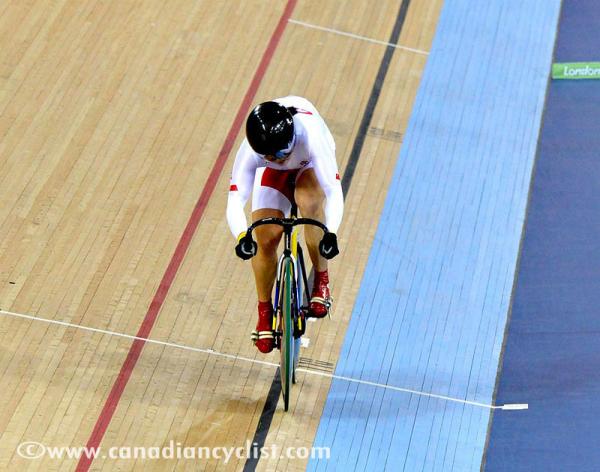
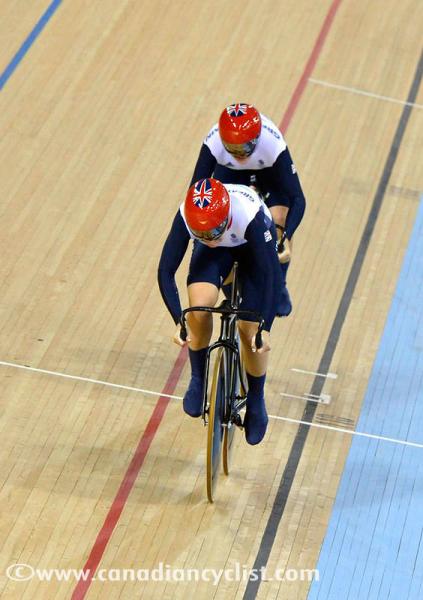
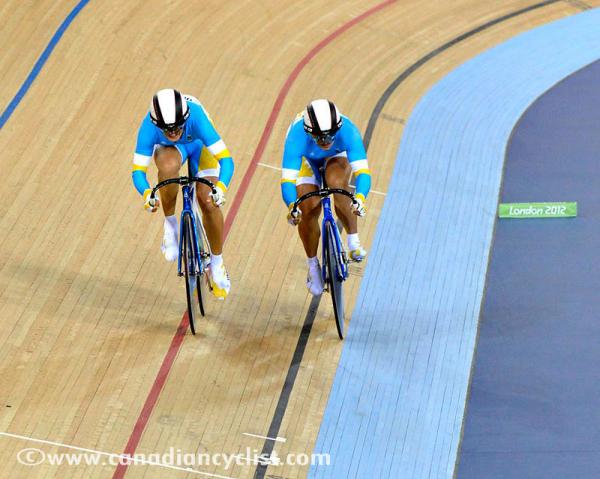
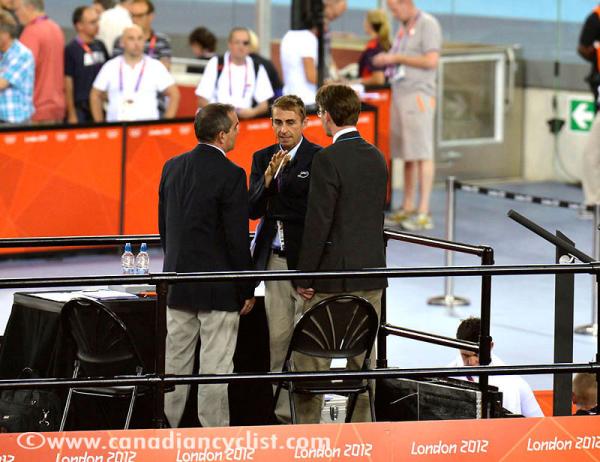
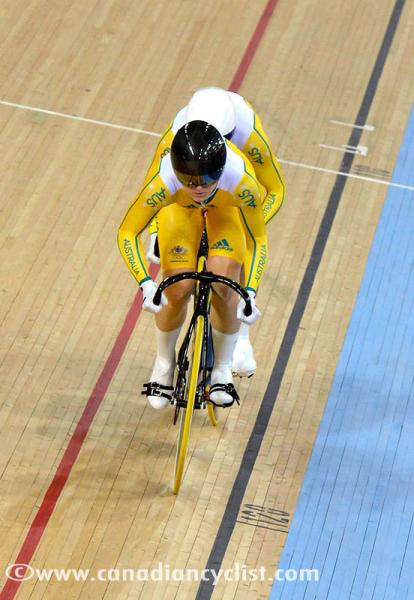
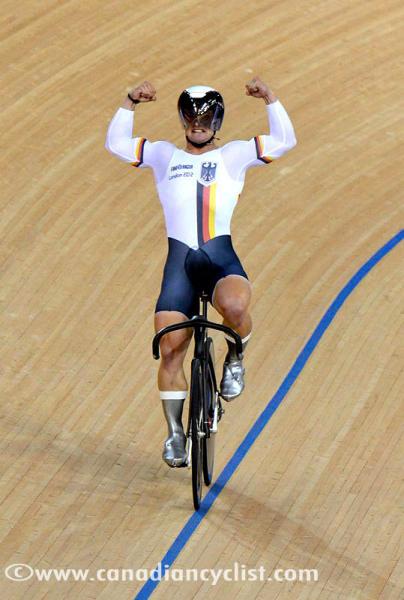
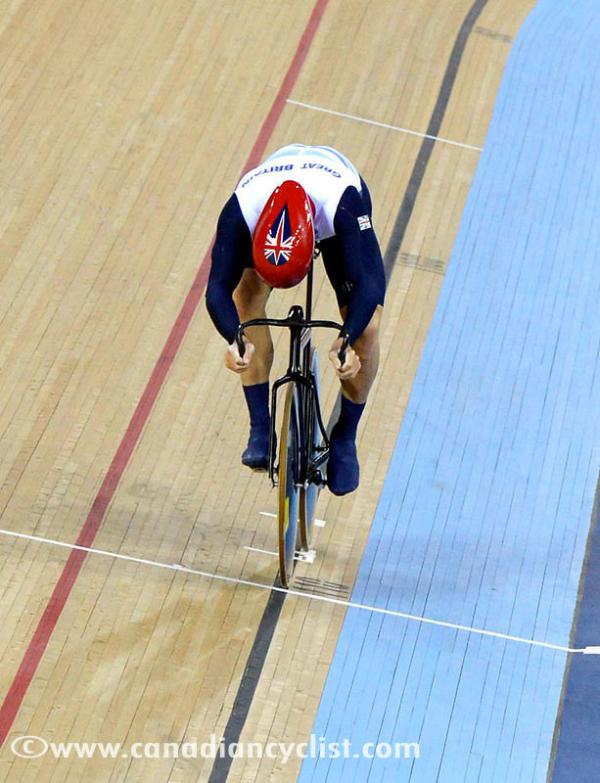
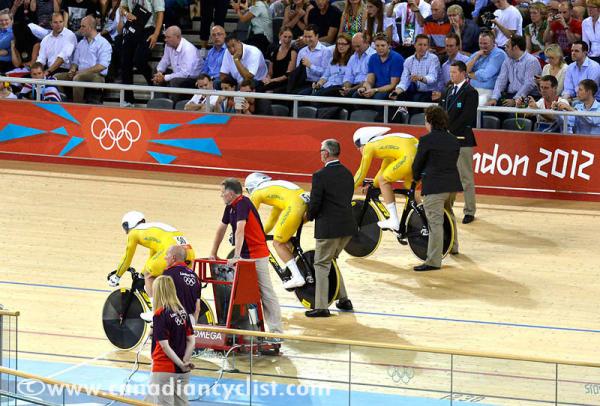
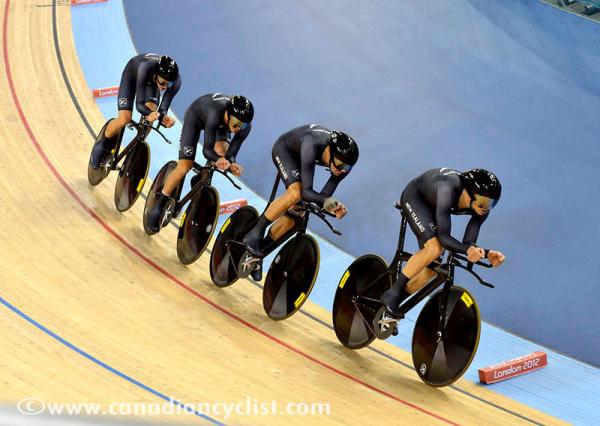
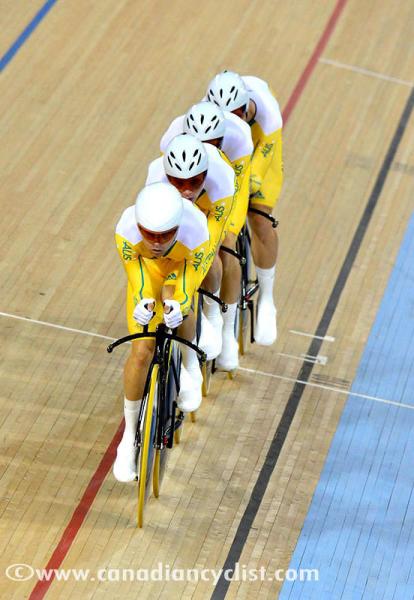
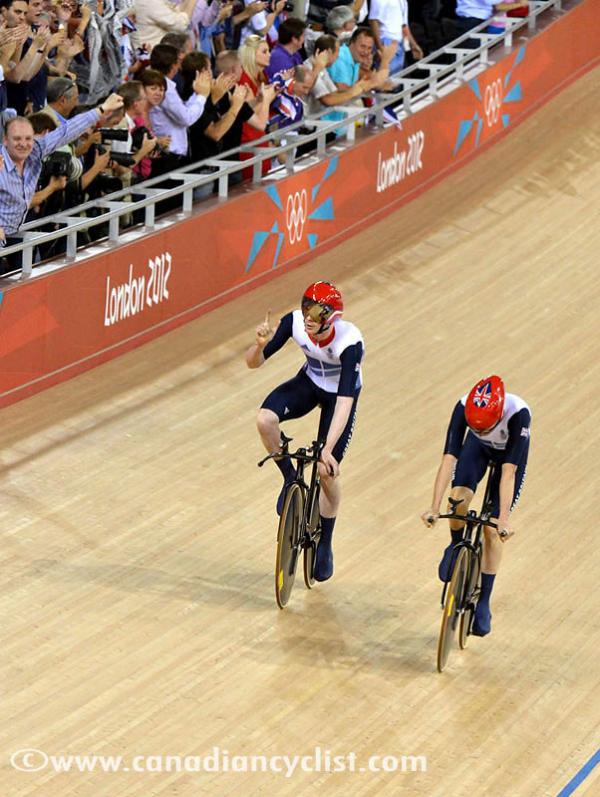
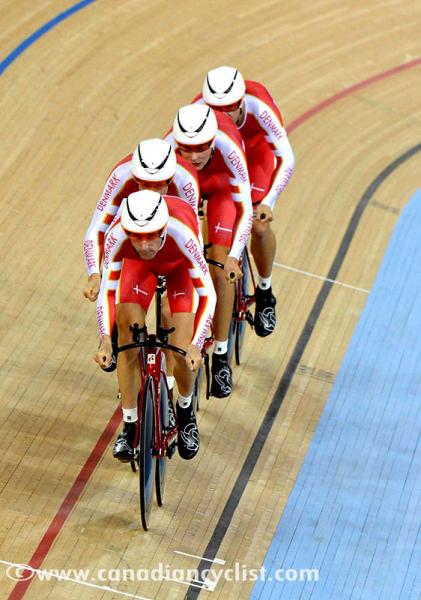
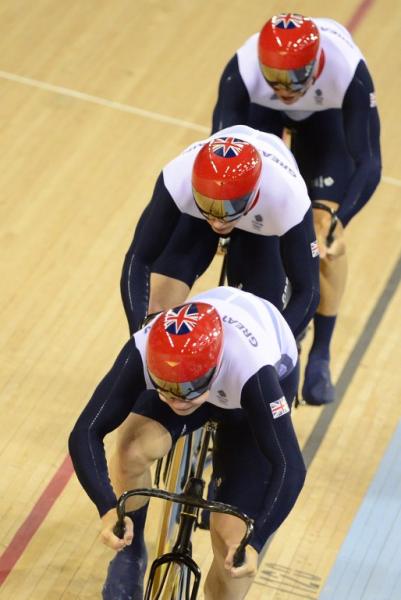
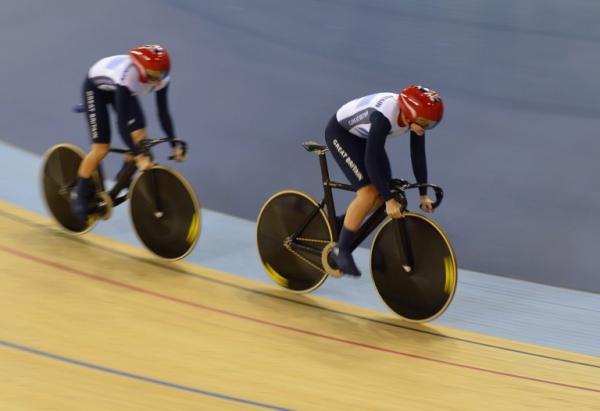
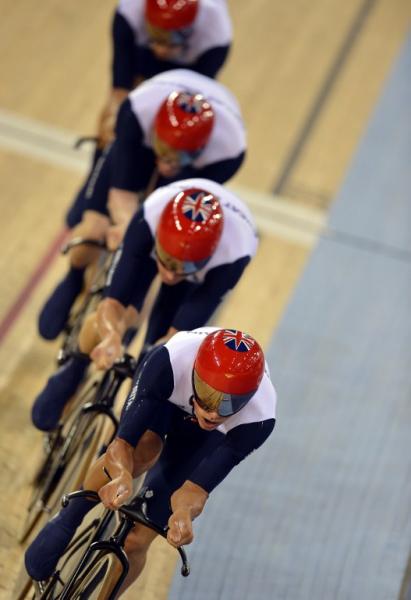
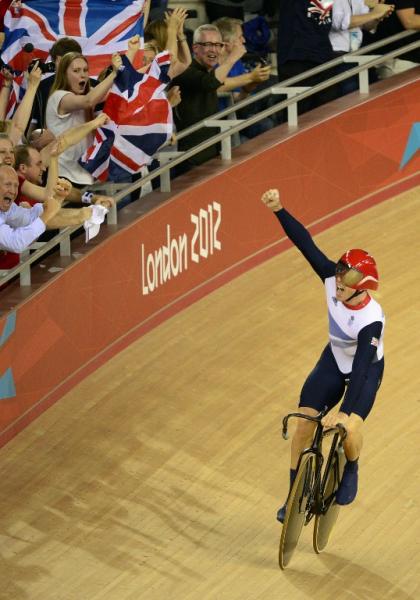
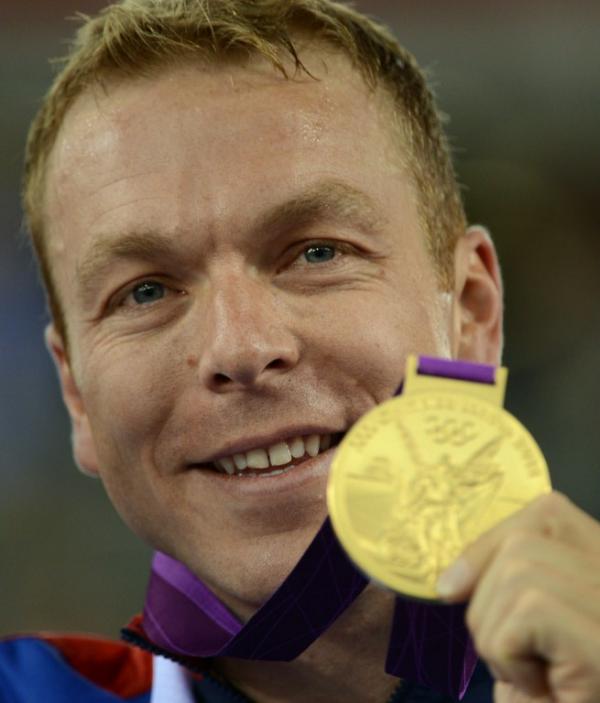
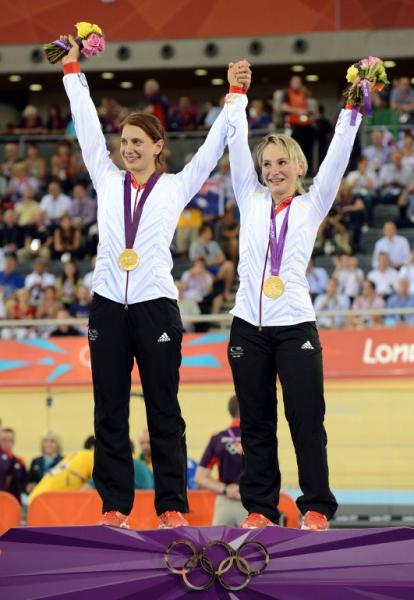
Men's Team Sprint
Sir Chris Hoy ushered the next generation of British talent to gold in the Olympic Games, putting in a blistering final leg of the men's team sprint to help Great Britain to win over France.
Starter Philip Hindes, second man Jason Kenny and Sir Hoy were not content to set the winning mark: they proved both in qualifying and finals that they were the best in the world by going faster than any three men had done over the distance in history - in round 1, they went under the world record mark, set by Germany in 2011 (42.914), with a time of 42.747.
In the final against France's Gregory Bauge, Kevin Sireau and Michael d'Almeida, the British trio went even faster, 42.600 - huge improvements in this short distance - to take home the gold.
"This is the most memorable gold medal of my career," Hoy said of number five. "When I threw my bike at the line and I heard the roar of the crowd, I knew we'd won.
"I thought my first win in Athens was the most memorable for me but this is by far the greatest win. It's an incredible feeling, the crowd have been fantastic. The whole country has been getting behind the Olympics.
"We knew it was possible," Hoy said of their performance. "This didn't just come out of the blue, but we knew if we kept it together, we had to have the best possible race. It's easier said than done. We had an excellent training camp in Newport. We had the full support of the team, and we nailed it."
Jason Kenny said the team was driven after being relegated from the world championships earlier this year in Melbourne. "We really wanted to do this after our world championships went disastrously wrong. We kept it really tight and controlled the emotions."
It is his second gold medal, but like Hoy he said the one in Beijing could not compare with today. "This one is unbelievable. It's great, isn't it? I cannot believe how good things went here today. There are a few guys here who are absolutely flying, we knew it was going to be a really close competition. This was probably the closest sprint competition there's ever been."
The French team were not at all satisfied to get silver again in a repeat performance of the 2008 Olympic Games in Beijing.
"It feels bitter. We're vice-champions. We felt ready for this but it still feels bitter," said Bauge. Sireau, also on the silver medal team that year agreed. "Happy with silver? Yes and no. A silver is still an Olympic medal. We prepared for gold. We already had a silver from Beijing so we know how that feels."
In the bronze medal final, Germany's Rene Enders, Robert Forstemann and Max Levy rode consistently quick to best Australia (Shane Perkins, Scott Sunderland and Matthew Glaetzer) by 0.149 seconds.
But unbeknownst to most of the crowd, Germany had a last minute change in their line-up when Stefan Nimke, a three-time Olympian and part of the gold medal team in Athens, and the bronze medal team in Beijing, pulled out due to back injuries suffered following a crash in training.
"Nimke is a big hero to us. He has had a lot of success in the past, but half hour before the start he said he cannot race," said Levy, giving respect to Nimke for his honesty. "We had to change our positions. Robert took the second wheel which was planned for me, so I went to the third wheel in qualification heat. We just had to get top 8. In so little time it is not possible to make a perfect race."
Forstemann, on the other hand, was thrilled to get a medal that he never once expected. "It is a great feeling to have an Olympic medal. I was just the reserve for the team sprint," said Forstemann. "If you had said to me this morning I would be in a medal final, I would not have believed it."
The world champion Australians were disappointed to miss out on the medals. Shane Perkins led off with a lap that was 0.3 seconds the pace of Enders, and Scott Sunderland and finisher Matthew Glaetzer could not close the gap. "No one likes to come fourth, but we left our best rides out there," Perkins said. "Obviously, being world champions, you expect to win at least a medal, but we were beaten by some classy teams."
The men's team sprint began with some opening night jitters, as the first two heats - Poland and Venezuela followed by China and Japan - suffered from starting mishaps. The problems continued in the heat between Great Britain and Germany when the home team's newest rider, Philip Hindes, appeared to dislocate his wheel in the staring gate, and he went tumbling in the first turn. That didn't slow down the British, however, after the re-start they went on to soundly beat the Germans, going 43.065 to the German's 43.710.
Some pundits called Hindes' crash an intentional dive in order to force a re-start, but the young German with a British father denied that he fell on purpose. "I just lost control in the turn - after I came out of the gate my wheel slipped and I couldn't handle the bike, and just crashed."
France, Australia and Russia were next fastest, with Germany slotting in for fifth over China. New Zealand and Japan made the next round, while Venezuela and Poland headed home. The first round heats determined which countries would race for gold and which for bronze. Germany won its heat over Russia, while Australia beat China.
France easily cruised to the win over New Zealand, setting a benchmark of 42.991, the quickest time recorded of the night, and the first under 43 seconds. But it would soon prove to be second best, as Great Britain whipped the crowd into a frenzy by setting a new world record in its heat against Japan, in 42.747.
Having been relegated in the world championships earlier this year, the British trio would be excused for being a bit more careful in the gold medal round, but careful is not a word one can apply to the team. They rode with confidence, grace and power to better their previous time and bring home their country's second cycling gold medal after Bradley Wiggins in the time trial.
Women's Team Sprint
Germany came away with its first gold medal in cycling of the 2012 Olympic Games, with Miriam Welte and Kristina Vogel climbing onto the top step of the podium in the Olympic velodrome in London.
China's Gong Jinjie leading and Guo Shuang looked set to win the gold, coming across the line 0.179 seconds quicker than Germany in the final, but were relegated to silver for a botched exchange.
The stunning news came after the Chinese had already celebrated their victory lap and the Germans had gone off to do their interviews. Once back inside the track, Vogel and Welte were quickly cleaned up and whisked away to the medal ceremony to receive their first gold medals.
"It was a bit weird, we were having an interview with the BBC when one of the women said hey, look at the screen - you've got the gold medal," Welte said. "It was amazing to win the silver, but when you find out that you have won the gold - it's an amazing moment that we can't describe.
"It is the first time this event is in the Olympics, we won the first gold in the team sprint. When you are world champions that is just for one year, but an Olympic title is for a lifetime. It is just amazing."
The Chinese were not the only team to be hit by relegations: in the first round Great Britain, who went second fastest in qualifying, were penalized for an early exchange by Jessica Varnish and Victoria Pendleton.
Vogel noted that the exchange line was difficult to see while traveling some 65kph, and that was likely why the teams had problems with going outside the zone. "It wasn't the way we wanted to win, because the Chinese were faster," Vogel said, but at the same time thanking their luck not only for getting them upgraded to the gold medal final when the British were relegated, but then again when the Chinese met the same fate. "After the British girls were relegated and we made the gold medal final, I said to Kristina 'maybe we can get it'."
Get it they did, but Gong Jinjie was clearly disappointed when the Chinese team finally appeared before the press after being subjected to blood and urine doping controls. "Today we got the silver medal in regrettable circumstances, but we will accept this with grace," Gong said.
Gong could not explain what went wrong, saying that even she did not know where the team broke the rules, which specify that the first rider must be behind the second rider by a certain zone at the end of the first lap.
The strict interpretation of the rules benefited the Australians: due to the oddities in the Olympic rules, whereby only winners move onto the finals, Britain's opponents Ukraine went up against Kaarle McCulloch and Anna Meares in the bronze medal final, even though the Netherlands were the fourth fastest classified finishers.
Australia beat Ukraine handily to win the bronze, with Anna Meares adding another medal to her collection, while for Kaarle McCulloch the bronze was a first.
"We probably benefited a little bit from the British being disqualified," Meares said. "I can only imagine how devastating that was for them. It was bittersweet for Kaarle and I."
Meares will face off in the keirin and individual sprint, while in contrast, McCulloch, who was racing in her sole Olympic event, was gutted to let her teammate down.
"I have to admit I didn't perform at the best of my abilities. It's unfortunate because I was in the best shape of my life. I'm pretty disappointed I let the team down, but to get a bronze medal is still fantastic."
The world record ride of Gong and Guo in the first round was little consolation for the Chinese. The duo set a 32.422 in the first round to take that unofficial mark. But as the officials showed at the world championships in Melbourne, they were not afraid to enforce the rules when it came to the finals.
"We had the strength," Gong said. "We showed that today. Today we had this small event, we must face reality. This event will be a driving force for us after today."
In the Olympics, the format of the women's team sprint differs from that of the world championships. It began with the qualifying round, where ten teams would be reduced to eight based upon the times set in the opening heats. Korea and Colombia were the first to be eliminated from the competition, while at the other end of the spectrum, Great Britain thrilled the crowds by going up against their arch rivals Australia in the opening round and pulling out a 0.3 second advantage by the line in the first of the Pendleton versus Meares match-ups.
Britain's 32.526 was a new Olympic Record, of course as the event makes its debut in the Games, but it also bettered the world mark set by Germany in the world championships in Melbourne. There was very little time for celebration, however, as in the very next heat that record would fall at the hands of China's Guo and Gong, who rode in with a 32.447.
The Chinese pair continued their dominance in the next round, where teams were seeded fastest over slowest, the winners of each heat moving onto the medal rounds. Australia won its heat over The Netherlands, Germany won over France, and the next two rounds would determine who raced for gold and who raced for bronze by time.
Great Britain faced up against Ukraine, and Jess Varnish put in another solid first lap, but disaster struck them at the end of the lap where it was determined that Pendleton had pushed ahead before the exchange line. Even though she put in another lightning fast closing lap, it was later announced the team had been relegated to last place for the missed exchange.
The house was silent as China hammered Venezuela with a new world record pace, going 32.422 to move onto the gold medal final against Germany, who was next quickest once the British team were relegated. The Australians, who were a tenth of a second slower, would face Ukraine for bronze.
When the time finally came for the bronze medal final, Australia easily topped the Ukrainians, going home in 32.727, well ahead. The gold medal final hardly sparked the interest of the British fans lining the stadium, although it was one of the closest line-ups of the evening. The Chinese were ahead by a tenth of a second margin, but it did them no good as Germany won the gold by executing their race within the rules.
| 1 | Great Britain | 0:00:43.065 |
| Row 1 - Cell 0 | Philip Hindes | Row 1 - Cell 2 |
| Row 2 - Cell 0 | Chris Hoy | Row 2 - Cell 2 |
| Row 3 - Cell 0 | Jason Kenny | Row 3 - Cell 2 |
| 2 | France | 0:00:43.097 |
| Row 5 - Cell 0 | Gregory Bauge | Row 5 - Cell 2 |
| Row 6 - Cell 0 | Michael D'Almeida | Row 6 - Cell 2 |
| Row 7 - Cell 0 | Kevin Sireau | Row 7 - Cell 2 |
| 3 | Australia | 0:00:43.377 |
| Row 9 - Cell 0 | Matthew Glaetzer | Row 9 - Cell 2 |
| Row 10 - Cell 0 | Shane Perkins | Row 10 - Cell 2 |
| Row 11 - Cell 0 | Scott Sunderland | Row 11 - Cell 2 |
| 4 | Russia | 0:00:43.681 |
| Row 13 - Cell 0 | Sergey Borisov | Row 13 - Cell 2 |
| Row 14 - Cell 0 | Denis Dmitriev | Row 14 - Cell 2 |
| Row 15 - Cell 0 | Sergey Kucherov | Row 15 - Cell 2 |
| 5 | Germany | 0:00:43.710 |
| Row 17 - Cell 0 | Rene Enders | Row 17 - Cell 2 |
| Row 18 - Cell 0 | Robert Forstemann | Row 18 - Cell 2 |
| Row 19 - Cell 0 | Maximilian Levy | Row 19 - Cell 2 |
| 6 | China | 0:00:43.751 |
| Row 21 - Cell 0 | Cheng Changsong | Row 21 - Cell 2 |
| Row 22 - Cell 0 | Zhang Lei | Row 22 - Cell 2 |
| Row 23 - Cell 0 | Zhang Miao | Row 23 - Cell 2 |
| 7 | New Zealand | 0:00:44.175 |
| Row 25 - Cell 0 | Edward Dawkins | Row 25 - Cell 2 |
| Row 26 - Cell 0 | Ethan Mitchell | Row 26 - Cell 2 |
| Row 27 - Cell 0 | Simon van Velthooven | Row 27 - Cell 2 |
| 8 | Japan | 0:00:44.324 |
| Row 29 - Cell 0 | Seiichiro Nakagawa | Row 29 - Cell 2 |
| Row 30 - Cell 0 | Yudai Nitta | Row 30 - Cell 2 |
| Row 31 - Cell 0 | Kazunari Watanabe | Row 31 - Cell 2 |
| 9 | Venezuela | 0:00:44.654 |
| Row 33 - Cell 0 | Hersony Canelon | Row 33 - Cell 2 |
| Row 34 - Cell 0 | Cesar Marcano | Row 34 - Cell 2 |
| Row 35 - Cell 0 | Angel Pulgar | Row 35 - Cell 2 |
| 10 | Poland | 0:00:44.712 |
| Row 37 - Cell 0 | Maciej Bielecki | Row 37 - Cell 2 |
| Row 38 - Cell 0 | Kamil Kuczynski | Row 38 - Cell 2 |
| Row 39 - Cell 0 | Damian Zielinski | Row 39 - Cell 2 |
| 1 | Germany | 0:00:43.178 |
| Row 1 - Cell 0 | Rene Enders | Row 1 - Cell 2 |
| Row 2 - Cell 0 | Robert Forstemann | Row 2 - Cell 2 |
| Row 3 - Cell 0 | Maximilian Levy | Row 3 - Cell 2 |
| 2 | Russia | 0:00:43.909 |
| Row 5 - Cell 0 | Sergey Borisov | Row 5 - Cell 2 |
| Row 6 - Cell 0 | Denis Dmitriev | Row 6 - Cell 2 |
| Row 7 - Cell 0 | Sergey Kucherov | Row 7 - Cell 2 |
| 1 | Australia | 0:00:43.261 |
| Row 1 - Cell 0 | Matthew Glaetzer | Row 1 - Cell 2 |
| Row 2 - Cell 0 | Shane Perkins | Row 2 - Cell 2 |
| Row 3 - Cell 0 | Scott Sunderland | Row 3 - Cell 2 |
| 2 | China | 0:00:43.505 |
| Row 5 - Cell 0 | Cheng Changsong | Row 5 - Cell 2 |
| Row 6 - Cell 0 | Zhang Lei | Row 6 - Cell 2 |
| Row 7 - Cell 0 | Zhang Miao | Row 7 - Cell 2 |
| 1 | France | 0:00:42.991 |
| Row 1 - Cell 0 | Gregory Bauge | Row 1 - Cell 2 |
| Row 2 - Cell 0 | Michael D'Almeida | Row 2 - Cell 2 |
| Row 3 - Cell 0 | Kevin Sireau | Row 3 - Cell 2 |
| 2 | New Zealand | 0:00:43.495 |
| Row 5 - Cell 0 | Edward Dawkins | Row 5 - Cell 2 |
| Row 6 - Cell 0 | Ethan Mitchell | Row 6 - Cell 2 |
| Row 7 - Cell 0 | Simon van Velthooven | Row 7 - Cell 2 |
| 1 | Great Britain | 0:00:42.747 |
| Row 1 - Cell 0 | Philip Hindes | Row 1 - Cell 2 |
| Row 2 - Cell 0 | Chris Hoy | Row 2 - Cell 2 |
| Row 3 - Cell 0 | Jason Kenny | Row 3 - Cell 2 |
| 2 | Japan | 0:00:43.964 |
| Row 5 - Cell 0 | Seiichiro Nakagawa | Row 5 - Cell 2 |
| Row 6 - Cell 0 | Yudai Nitta | Row 6 - Cell 2 |
| Row 7 - Cell 0 | Kazunari Watanabe | Row 7 - Cell 2 |
| 1 | Great Britain | 0:00:42.600 |
| Row 1 - Cell 0 | Philip Hindes | Row 1 - Cell 2 |
| Row 2 - Cell 0 | Chris Hoy | Row 2 - Cell 2 |
| Row 3 - Cell 0 | Jason Kenny | Row 3 - Cell 2 |
| 2 | France | 0:00:43.013 |
| Row 5 - Cell 0 | Gregory Bauge | Row 5 - Cell 2 |
| Row 6 - Cell 0 | Michael D'Almeida | Row 6 - Cell 2 |
| Row 7 - Cell 0 | Kevin Sireau | Row 7 - Cell 2 |
| 3 | Germany | 0:00:43.209 |
| Row 1 - Cell 0 | Rene Enders | Row 1 - Cell 2 |
| Row 2 - Cell 0 | Robert Forstemann | Row 2 - Cell 2 |
| Row 3 - Cell 0 | Maximilian Levy | Row 3 - Cell 2 |
| 4 | Australia | 0:00:43.355 |
| Row 5 - Cell 0 | Matthew Glaetzer | Row 5 - Cell 2 |
| Row 6 - Cell 0 | Shane Perkins | Row 6 - Cell 2 |
| Row 7 - Cell 0 | Scott Sunderland | Row 7 - Cell 2 |
| 1 | Great Britain | 0:03:52.499 |
| Row 1 - Cell 0 | Edward Clancy | Row 1 - Cell 2 |
| Row 2 - Cell 0 | Geraint Thomas | Row 2 - Cell 2 |
| Row 3 - Cell 0 | Steven Burke | Row 3 - Cell 2 |
| Row 4 - Cell 0 | Peter Kennaugh | Row 4 - Cell 2 |
| 2 | Australia | 0:03:55.694 |
| Row 6 - Cell 0 | Jack Bobridge | Row 6 - Cell 2 |
| Row 7 - Cell 0 | Glenn O'Shea | Row 7 - Cell 2 |
| Row 8 - Cell 0 | Rohan Dennis | Row 8 - Cell 2 |
| Row 9 - Cell 0 | Michael Hepburn | Row 9 - Cell 2 |
| 3 | New Zealand | 0:03:57.607 |
| Row 11 - Cell 0 | Sam Bewley | Row 11 - Cell 2 |
| Row 12 - Cell 0 | Westley Gough | Row 12 - Cell 2 |
| Row 13 - Cell 0 | Marc Ryan | Row 13 - Cell 2 |
| Row 14 - Cell 0 | Jesse Sergent | Row 14 - Cell 2 |
| 4 | Denmark | 0:03:58.298 |
| Row 16 - Cell 0 | Lasse Norman Hansen | Row 16 - Cell 2 |
| Row 17 - Cell 0 | Michael Morkov | Row 17 - Cell 2 |
| Row 18 - Cell 0 | Rasmus Christian Quaade | Row 18 - Cell 2 |
| Row 19 - Cell 0 | Casper von Folsach | Row 19 - Cell 2 |
| 5 | Russia | 0:03:59.264 |
| Row 21 - Cell 0 | Evgeny Kovalev | Row 21 - Cell 2 |
| Row 22 - Cell 0 | Ivan Kovalev | Row 22 - Cell 2 |
| Row 23 - Cell 0 | Alexey Markov | Row 23 - Cell 2 |
| Row 24 - Cell 0 | Alexander Serov | Row 24 - Cell 2 |
| 6 | Spain | 0:04:02.113 |
| Row 26 - Cell 0 | Pablo Aitor Bernal Rosique | Row 26 - Cell 2 |
| Row 27 - Cell 0 | Sebastian Mora Vedri | Row 27 - Cell 2 |
| Row 28 - Cell 0 | David Muntaner Juaneda | Row 28 - Cell 2 |
| Row 29 - Cell 0 | Albert Torres Barcelo | Row 29 - Cell 2 |
| 7 | Colombia | 0:04:03.712 |
| Row 31 - Cell 0 | Juan Esteban Arango Carvajal | Row 31 - Cell 2 |
| Row 32 - Cell 0 | Edwin Alcibiades Avila Vanegas | Row 32 - Cell 2 |
| Row 33 - Cell 0 | Arles Antonio Castro Laverde | Row 33 - Cell 2 |
| Row 34 - Cell 0 | Weimar Alfonso Roldan Ortiz | Row 34 - Cell 2 |
| 8 | Netherlands | 0:04:03.818 |
| Row 36 - Cell 0 | Levi Heimans | Row 36 - Cell 2 |
| Row 37 - Cell 0 | Jenning Huizenga | Row 37 - Cell 2 |
| Row 38 - Cell 0 | Wim Stroetinga | Row 38 - Cell 2 |
| Row 39 - Cell 0 | Tim Veldt | Row 39 - Cell 2 |
| 9 | Belgium | 0:04:04.053 |
| Row 41 - Cell 0 | Gijs van Hoecke | Row 41 - Cell 2 |
| Row 42 - Cell 0 | Dominique Cornu | Row 42 - Cell 2 |
| Row 43 - Cell 0 | Jonathan Dufrasne | Row 43 - Cell 2 |
| Row 44 - Cell 0 | Kenny de Ketele | Row 44 - Cell 2 |
| 10 | Korea | 0:04:07.210 |
| Row 46 - Cell 0 | Seung Woo Choi | Row 46 - Cell 2 |
| Row 47 - Cell 0 | Sun Jae Jang | Row 47 - Cell 2 |
| Row 48 - Cell 0 | Keon Woo Park | Row 48 - Cell 2 |
| Row 49 - Cell 0 | Seonho Park | Row 49 - Cell 2 |
| 1 | China | 0:00:32.447 |
| Row 1 - Cell 0 | Gong Jinjie | Row 1 - Cell 2 |
| Row 2 - Cell 0 | Guo Shuang | Row 2 - Cell 2 |
| 2 | Great Britain | 0:00:32.526 |
| Row 4 - Cell 0 | Victoria Pendleton | Row 4 - Cell 2 |
| Row 5 - Cell 0 | Jessica Varnish | Row 5 - Cell 2 |
| 3 | Germany | 0:00:32.630 |
| Row 7 - Cell 0 | Kristina Vogel | Row 7 - Cell 2 |
| Row 8 - Cell 0 | Miriam Welte | Row 8 - Cell 2 |
| 4 | Australia | 0:00:32.825 |
| Row 10 - Cell 0 | Kaarle McCulloch | Row 10 - Cell 2 |
| Row 11 - Cell 0 | Anna Meares | Row 11 - Cell 2 |
| 5 | Netherlands | 0:00:33.253 |
| Row 13 - Cell 0 | Yvonne Hijgenaar | Row 13 - Cell 2 |
| Row 14 - Cell 0 | Willy Kanis | Row 14 - Cell 2 |
| 6 | France | 0:00:33.638 |
| Row 16 - Cell 0 | Sandie Clair | Row 16 - Cell 2 |
| Row 17 - Cell 0 | Virginie Cueff | Row 17 - Cell 2 |
| 7 | Ukraine | 0:00:33.708 |
| Row 19 - Cell 0 | Lyubov Shulika | Row 19 - Cell 2 |
| Row 20 - Cell 0 | Olena Tsyos | Row 20 - Cell 2 |
| 8 | Venezuela | 0:00:34.320 |
| Row 22 - Cell 0 | Daniela Grelui Larreal | Row 22 - Cell 2 |
| Row 23 - Cell 0 | Mariaesthela Vilera | Row 23 - Cell 2 |
| 9 | Korea | 0:00:34.636 |
| Row 25 - Cell 0 | Lee Eun Ji | Row 25 - Cell 2 |
| Row 26 - Cell 0 | Lee Hyejin | Row 26 - Cell 2 |
| 10 | Colombia | 0:00:34.870 |
| Row 28 - Cell 0 | Diana Maria Garcia Orrego | Row 28 - Cell 2 |
| Row 29 - Cell 0 | Juliana Gaviria Rendon | Row 29 - Cell 2 |
| 1 | Australia | 0:00:32.806 |
| Row 1 - Cell 0 | Kaarle McCulloch | Row 1 - Cell 2 |
| Row 2 - Cell 0 | Anna Meares | Row 2 - Cell 2 |
| 2 | Netherlands | 0:00:33.090 |
| Row 4 - Cell 0 | Yvonne Hijgenaar | Row 4 - Cell 2 |
| Row 5 - Cell 0 | Willy Kanis | Row 5 - Cell 2 |
| 1 | Germany | 0:00:32.701 |
| Row 1 - Cell 0 | Kristina Vogel | Row 1 - Cell 2 |
| Row 2 - Cell 0 | Miriam Welte | Row 2 - Cell 2 |
| 2 | France | 0:00:33.707 |
| Row 4 - Cell 0 | Sandie Clair | Row 4 - Cell 2 |
| Row 5 - Cell 0 | Virginie Cueff | Row 5 - Cell 2 |
| 1 | Ukraine | 0:00:33.620 |
| Row 1 - Cell 0 | Lyubov Shulika | Row 1 - Cell 2 |
| Row 2 - Cell 0 | Olena Tsyos | Row 2 - Cell 2 |
| 2 | Great Britain | REL |
| Row 4 - Cell 0 | Victoria Pendleton | Row 4 - Cell 2 |
| Row 5 - Cell 0 | Jessica Varnish | Row 5 - Cell 2 |
| 1 | China | 0:00:32.422 |
| Row 1 - Cell 0 | Gong Jinjie | Row 1 - Cell 2 |
| Row 2 - Cell 0 | Guo Shuang | Row 2 - Cell 2 |
| 2 | Venezuela | 0:00:34.415 |
| Row 4 - Cell 0 | Daniela Grelui Larreal | Row 4 - Cell 2 |
| Row 5 - Cell 0 | Mariaesthela Vilera | Row 5 - Cell 2 |
| 1 | Germany | 0:00:32.798 |
| Row 1 - Cell 0 | Kristina Vogel | Row 1 - Cell 2 |
| Row 2 - Cell 0 | Miriam Welte | Row 2 - Cell 2 |
| 2 | China | REL |
| Row 4 - Cell 0 | Gong Jinjie | Row 4 - Cell 2 |
| Row 5 - Cell 0 | Guo Shuang | Row 5 - Cell 2 |
| 3 | Australia | 0:00:32.727 |
| Row 1 - Cell 0 | Kaarle McCulloch | Row 1 - Cell 2 |
| Row 2 - Cell 0 | Anna Meares | Row 2 - Cell 2 |
| 4 | Ukraine | 0:00:33.491 |
| Row 4 - Cell 0 | Lyubov Shulika | Row 4 - Cell 2 |
| Row 5 - Cell 0 | Olena Tsyos | Row 5 - Cell 2 |
The latest race content, interviews, features, reviews and expert buying guides, direct to your inbox!

Laura Weislo has been with Cyclingnews since 2006 after making a switch from a career in science. As Managing Editor, she coordinates coverage for North American events and global news. As former elite-level road racer who dabbled in cyclo-cross and track, Laura has a passion for all three disciplines. When not working she likes to go camping and explore lesser traveled roads, paths and gravel tracks. Laura specialises in covering doping, anti-doping, UCI governance and performing data analysis.
Latest on Cyclingnews
-
'A lot of chances' – Mathieu van der Poel and Jasper Philipsen reunite to target success on multiple fronts during Tour de France's opening week
'Yellow is an objective' says Philipsen, while Van der Poel rules himself out of green jersey contention, instead targeting Classics-style hilly stages -
The 5km rule returns at the Tour de France, but bonus second sprints are out
Several rules and regulations get tweaked ahead of this year's Tour -
'Maybe making the bunch even bigger is a mistake' – Mathieu van der Poel questions safety of increased Tour de France peloton size
Dutchman weighs in on debate with the bunch of all Grand Tours increasing from 22 to 23 teams and from 176 riders to 184 -
Tour de France jerseys: Here's are the competitions every rider wants to win this July
Details of the four iconic leader's jerseys and the minor prizes at the race explained
